#I also made a whole religion for the Ancestors
Explore tagged Tumblr posts
Text
It's funny to me that I should be working on my active story, yet I find myself either making more lore for the Precursors and Ancestors from Halo or working on other story ideas for Demon Slayers.
My motivation for Pale Blue Dot might be shot, but it certainly isn't for my other story ideas.
#my post#ao3 fanfic#pale blue dot#writing#Halo#Demon Slayer#kny#Please ask me about my Halo headcanons and lore#And my other Demon Slayer story ideas#Please#Cause I have too many of them and can barely decide which one to focus on.#Not only that#I also made a whole religion for the Ancestors#And subsequently made lore for the Precursors#I may or may not be well#And said religion is getting a rework#That's 50+ gods I gotta rewrite#But at least I found art for them!#I might post those rewrites here#Would people even be interested in that?
1 note
·
View note
Text
you know i must have been bone-tired when this part of the herb brides lore didn't come to my mind when i discussed how the Kin fundamentally differs from the cultures it is inspired by um There Is The Human Sacrifice part. like it's an important part of pathologic 2 that you are doing human, or anthropomorphic (if you want to see the Herb Brides as closer to spirits, which comes with its own set of problematics regarding how to approach their oppression) sacrifice. it's an important part of pathologic 2 that you kill a woman, as part of the journey and in direct resonance with you ritualistically killing cattle earlier, and she offers herself to you with cultural and religious significance.
human sacrifices have been done across the globe for millennia, but i cannot, for the life of me, find any source at all that mentions the Buryats (since that was the discussion point) partaking in human sacrifices by the turn of the 19th-early 20th century (or even anything past the 16th). every single source mentioning offerings and sacrifices i've read mentions animals, things such as milk and vodka, and often both at once. would love to read anything about these rituals if papers exist, but i'm personally drawing a blank.
the Kin has Obvious and very Visible influences but it also differs from specific (in this discussion's case, the Buryats) or wider (here, turkic/mongolic as a whole) cultures from the area by so many pieces, big and small, that i wouldn't have enough appendages on my whole body to count them all. and sister. i have plenty of appendages.
#i AM reading a paper that mentions the human sacrifices at Mongol burials where people (typically servants or family) would be sacrificed#to accompany the dead; as well as the Shor practice of sacrificing women/girls (replaced apparently quickly by sacrificing ducks)#but those seem pretty old [the Mongol part mentions the 13th century] & like. nothing about the buryats in that time period#i'm like 85% sure i saw in the beginning of being into patho someone saying how equating the Kin; who practice human sacrifices [& others]#to correlate/be meant to represent Real Life ethnicities is insulting because They Don't Do That.#and like. everythingggg that touches upon representation/appreciation/appropriation/theft is subjective and#informed my how much leeway you're willing to give the creators so that's like#bro i'm just reading PDFs#also just found out the discussion of ''The Kin Is Obviously Inspired But Not Meant To Represent [x]'' is over 2yrs old. we're still at it.#as anon said. ''unless you're tolkien; coming up with a whole fictional language is hard''.#anyways appendage time. stuff that differs just out of the top of my head:#everything relating to the religion which is almost a complete inverse of buryat tengrist/shamanic faith + don't get me started on buddhism#the clothes. the homes. the creation myths; beyond the apparition of Clay; which is present in so many cultures on earth#no swan ancestor. no lake worship. no sky/heavens. no tens of named hierarchical deities. NO BURBOT! no hats. no hats (burts into tears)#NO HORSES? ON THE EURASIAN STEPPE?#the belief that earth mustn't be cut is so buryat. i'm sure i've read it. no idea if it is also in other mongolic peoples but buryat it is.#also a bull-ancestor/bull totem. that exists in buryat tribes; but they also have a bunchhhhh of other sacred animals (including. swans.#also horses. there's this [charm?] made out of horse hair there is)#neigh (blabbers)#i'm realizin how crazy i sound repeating shit that has been said 2yrs ago but like someone already mentioned the human sacrifice.#someone already mentioned the clothes. someone already mentioned the yurts/gers. someone already mentioned the religion#like i'm just. repeating stuff. and yet. give it up for year 2
22 notes
·
View notes
Text
Mix 20: Together Again in the Next Life
The song choice for this story is Past Lives by Borns.
Here is Rayan:

Handsome, rich, and will be the head of his family some day. But there is an issue.
He is gay.
The issue was not his religion, but of the family rules. The heir of the house can not marry a man because he is expected to continue the line. If he was a second or third son, it would be ok, heck his second sister is dating his bestie for life, Laila.
This is nothing new for his family as supposedly his great grandfather had the same issue, but did his duty. As for his proposed mate, he & his family was sent to an eastern European country to live another life.
Thing is...fate has a funny way of striking back.
The one who he wants to be with is Luka:

Come to find out, he is the great grand nephew of his great grandfather's jilted lover.
It was an open secret, but the family of this rejected man wasn't abandoned by his ancestor. When his lover was sent away, his family went with him. As a protest, he never took another lover, but his sister did have descendants, and this is where Luka came in. They were employed to take care of one of Rayan's father's properties. It was a beautiful lake house.
Rayan & Luka grew up together in a way. He spent summers there, and they got to know each other that way, and when it came time to look at other people in that way, they fell in love.
Rayan told his father, but his father wouldn't budge. The family line continues with him no matter what.
He & Luka both graduated from university, separate ones at that in hopes that Rayan would fall in love with a girl and forget about Luka, but it didn't work. They made their long distance relationship work against all of the odds.
The family was unmoved. Rayan & his great grandfather were not the first & second cases of this, and they won out every-time. If Rayan walked out on them, they would move on to the second son.
Rayan was informed as an "graduation" gift that he would be married to the daughter of a powerful ceo of a beef company. They would marry in during the Muslim month of Sha'ban.
Rayan was devastated & so was Luka when he got the news.
Rayan was on his way to see his true love one more time. He would give into his family's demands. With the power & wealth, he could at least continue supporting Luka & his family.
The area was this dull blue-grey & overcast like in Twilight.
Rayan hated Twilight.
He walked through the home & found it empty of staff. This was typical so that Rayan & Luka could spend personal time together without prying eyes.
He was soon out back with the lake facing him. Luka was down there cutting the view. How could Rayan enjoy the view when the most beautiful man was right there.
Luka was holding a sign up:
"No shirt lift, No love."
Rayan was perplexed by this. Luka was bad at jokes and a tad strange when he tried to be romantic. His whole family was eccentric in their own ways. Luka's father was obsessed with oranges. Spent his whole life studying them.
Rayan did as the sign said:

He let it down and went to Luka. They both had beaming smiles. It was not too long before they broke into a hug.
The joy went into a slight sorrow.
"What's wrong my handsome ghurab," Luka wondered.
"You know why. I am off to be married to someone not you," Rayan said tearfully.
Luka's mood then turned sad as well, but more like an older brother trying to comfort their younger sibling. He then took his right hand and wiped the tears from Rayan's face and kissed his forehead.
"You know this will be the last ti-"
"Don't worry about that. You are here. I am here. Let's forget about that while we are here," Luka said.
Luka was eccentric, but he was also the more mature of the two. He had a habit of trying to make the best of even bad situations.
Rayan was under a lot of pressure. He was part of a family with a long history & silently powerful. Thousands of years of history was riding on him. His worries extended to more than just who he married. That power & wealth demanded growth or maintenance. If only Luka could be there by his side to assure him. But his father feared that Luka would be Rayan's side piece, getting caught once in the embrace of love making would take the family down. The family was unusually liberal about same sex relationships, but their society & religion was not.
Rayan could lose his life.
Luka broke away from their embrace, but kept his grip on Rayan's right hand. Rayan was the physically stronger between the two, but he was in no state to want to leave Luka's touch.
They were soon at the coast of the lake, water lapping at their feet in waves. It was warm, unusually warm.
Luka looked back at Rayan with the warm smile.
"Trust me," Luka said in a confident but soft tone.
He walked into the lake and pulled Rayan along with him. When he was waist deep, he let go of Rayan. He swam to the center of the lake, now just his upper neck & head visible.
Rayan was confused. Luka did a head nod to beckon Rayan to him. Rayan sighed and followed suit. After a few minutes they both were facing each other, just neck & heads.
They were deadpan in the face & staring at each other. They were noting every feature on each other's face.
The sky went from gloomy to deadly. It started to rain and lightning was heard & seen. Yet despite the danger, neither moved or talked about getting out of the water.
Luka love how the rain slid down Rayan's face, and in turn Rayan loved the bright contrast the light of lightning imparted on Luka's.
They were Rain & Lightning. Together they were the Storm.
Luka went underwater for a moment, and Rayan felt something under his shirt. After a few minutes of something touching him all over, Luka appeared above the water now sharing Rayan's shirt. It was stretchy enough to hold both.
"Just a moment," Luka said.
Rayan smiled but also clinched his teeth. Feeling Luka move about skin touching made him ticklish. Luka forced his legs through Rayan's pants and underwear. They were now wearing the same pair of clothes.
The shoes didn't make it. Both pairs fell off their feet with the socks, and were now sinking to the bottom of the lake.
They stared at each other without talking and started to kiss. Underneath the waves they embraced each other. One last cuddle in the lake surrounded by rain, wind, and lightning. It was as if mother nature was sad at their soon to be departure.
But something happened. A bolt of lightning hit the water near them. The lovers were felt no pain, but they quickly seized up and were out cold. Their eyes went literally white. They were still embracing each other.
Was this their fate? To die together young?
Luka & Rayan were now in a white space together. In that day's clothing but out of the water & dry. They were embracing each other, but when they came to they broke the embrace more concerned with their new surroundings.
"Where are we," Rayan thought.
"I don't know, maybe we broke the matrix," Luka said.
Luka hates The Matrix franchise.
Rayan flinched. Did he just hear Luka's thoughts? Did Luke hear his?
"Cool," Luka said. His calm nature & eccentric traits keeping him from panicking.
"I see you are still a scary cat even after reincarnation. I am sure the now me will fix that soon," a voice boomed.
A young man appeared before the duo. Luka was confused, but Rayan recognized him! Luka's great grand uncle, the one his own great grand father loved.
"Ha, as if. Maybe the new me will heal that scar on yours," another voice boomed.
Rayan turned, it was his great grand father, but in the prime of his youth.
"Jaddi," Rayan boomed.
"Still as emotional as always. I loved that about that you," his Yaddi said.
"Where are we, what is going on," both Luka & Rayan said at the same time.
Both ancestors looked around.
Yaddi said:
"I am guessing we are in both your head spaces. As for why, you two have been given a great opportunity. I know what you two are going through. I was in a similar boat."
He looked at his true love Omar. Samir blushed.
"We both were, but we didn't get a chance to choose this."
"What is this & why are you here," Luka asked.
Omar said:
"Like he said, this is your headspace. Quite empty by the way."
A chair popped out of nowhere behind Omar & he sat.
"Much better."
Samir did the same.
"You are getting a choice. See those two black swirls there, jump in & you wake up as Luka & Rayan and you copy the decisions of your past lives. Go through the green swirl & you movein this world together as one."
"We get to be together," Luka sounded excited.
"What do you mean past lives," Rayan asked.
Samir said:
"We are you and you are us. By some cosmic joke I reincarnated as my own great grandson & the heir at that."
Omar said:
"And my own great grand nephew. It appears that family traditions can't keep us apart. We found each other in the next life and fell in love again. My guess to give us a chance to choose different."
The ancestors got up and walked towards Luka & Rayan. They faded away into their respective current selves.
"Choose love," they both said.
Luka & Rayan were dumbfounded. They were soul mates. Literally.
It didn't take much convincing after that. They were soon at the green swirl. They took one deep breath together and jumped in together.
They were in a mental replica of the lake house. It was bright outside. Somehow they knew that they chose love, to be together.
This was their mental space now, his space now. They mentally became one. His mind & self being, founded in love.
Outside in the real world, the two lovers were still in the lake surrounded by the storm. Their heads were initially cocked back facing the sky, but their heads moved the rest on each other's shoulders. They also began to breath in tandem with each other. One exhaled, the other inhaled.
The side of their faces that were touching each other began to mix & merge with each other. Each breath pushing their heads closer & closer to being one.
Half way through this, their chest followed suit in merging more like melting, and their legs & feet too. The arms & hands that was touching their backs and obliques soon melted into those same backs.
When this was 75% done, their waists & nether regions mixed and merged.
A few more moments later and they were one humanoid mass. Featureless, but clearly human.
Another lightning bolt hit near this being. The energy released was used to fuel the next stage.
Luka's & Rayan's dna broke apart and remixed into a new helix.
If one could hear clearly underwater, they would hear cracks and pops. Luka was taller than Rayan, and so the new being's spine was getting longer. Pressure & release was felt as new vertebrae was forming. This happened with the legs and arms as well. And following the bone lengthening was bone thickening in all of the skeletal structure. This stopped once the being was 6'8.
As if a empty balloon, the chest began to fill slowly with new muscle as if it was taking in water. This also happened with the legs and arms. The being had no mouth but you could hear it moaning. As the muscles fill in, it felt itself getting physically stronger and stronger.
There was a sudden pop. The shoulders and neck exploded with muscle. More than what Luka & Rayan had.
"Ahhh"
Stomach was initially a bubble gut, but the skin began to get tighter. The passing of each second, the stomach began to shrink and tighten, the bubble gut gave way to an eight pack.
"Ugh"
At the same time the buttock grew two sizes in two pops, but the nether regions grew with more consistency, like he was getting slowly erect. At the skin tightening reached his nether regions, he had Rayan's girth, and Luka's length. His jewels were the combined mass totals of his fusees jewels.
The skin around his hands and toes tightened too, he now had properly formed digits.
His was breathing slowly now. Each breath brought in a facial feature.
His eyes were Rayan's, but had hints of Luka's. His eyebrows were a bushier form of Rayan's but a slight cut in the right eyebrow formed, a hallmark of Luka's scar. He had Luka's nose only a bit more flatter at the bottom. His ears were Luka's as well, but more rounder. His mouth a mix of the two. He had Luka's skull shape and chiseled features.
From his family jewels, a wave of testosterone flooded his body. Hair exploded from the base of his rod, a little in his chest, and all over his face. It was curly & black like Ryan's. Luka wanted Rayan to grow his hair out a little. He got that wish.
His skin color was at first like a swirl of two skin tones, but they settled on Rayan's.
Another lightning strike hit the water. The being was knocked out. He absorbed some of this energy as life force. Mother Nature was making sure he had an extra push.
He woke up, but he was lying on the coast of the lake instead of being inside it.
He stood up:

"What is going on, who am I," he wondered.
It was still raining but lightly, but the sun was coming out. It gave him a red glow.
He walked back to the lake house, and was greeted by the servants there. They greeted him by Rayan's family name to denote respect. He was taken to his bedroom to dry up & not get sick.
He looked at the mirror.
"I am Rayan, no Luka," he was struggling to remember who he was. He had both of their memories in complete detail. And yet he had ones completely his own.
After a dry off & some new clothes, he remembered everything. Luka & Rayan merged to form him so that could be together forever. He was the heir in Rayan's family, his family. He was set to marry Amira, heiress to some radish fortune. But unlike the beef heiress of the old timeline, he liked Amira. Liked, not loved. They grew up together & were best friends. Maybe they turn that like into love.
Thanks to the boldness & confidence Luka imparted in this being, he had postponed the wedding by almost a decade. He would be allowed to discover & grow into his adulthood.
He was Rayan, he was Luka, but more importantly, he was Nazih.
#male merge#body merging#merging tf#male fusion#fusion#thefusioncelestial#male body transformation#male transformation#merge#musclegrowth#muscle#muscular#male body merge
113 notes
·
View notes
Note
I saw your whole post about "Dominating the indomitable" and like no, it's that Jewish people act like they are literally the only group who have ever been oppressed, and how all other forms of oppression are actually antisemitism, and how as a result of this Jewish people can never ever perpetuate oppression against other groups. Horrible things have happened to Jewish people in the past therefore any criticism of the actions of Jewish people now is antisemitic, and even TALKING ABOUT the groups who were affected on a smaller scale during The Holocaust is antisemitic, actually. Jewish people, particularly in online spaces, demand solidarity with other minority groups but *insist* that your problems are the only ones that matter. And yet - False accusations of Antisemitism are constantly deployed en-masse, particularly with regard to Israel, to justify doing heinous fucking shit and to treat genocide as though it's in some way complicated. I'm from the UK, and for twelve years we had upper class asshole politicians saying every racist thing you could imagine about Muslims and literally nothing came of it. Then we had a left wing candidate for Prime Minister who criticised Israel ONCE, and the accusations of Antisemitism that followed instantly killed his career. While Antisemitism is real and is a problem a lot of Jewish people are perfectly happy to allow the Right Wing grifters who perpetrate Antisemitism to weaponise it in their name against people they don't like. You deny that you have ANY privelige relative to other religious minority groups and yet accusations of Antisemitism are the only kind that seem to be consistently taken seriously, even when they're overtly bullshit. But it's also the fact that as minority religious groups in the west go a LOT of Jewish people are rich white people, and the Jewish community as a whole refuses to in any way acknowledge the privelige that comes with that because "I'm not white I'm Jewish" as though you can't be both. Like literally right now, a nation of Jewish people are slaughtering a nation of Muslims on the grounds that being Jewish just makes them inherently entitled to the land those Muslims are on. We're seeing Jewish people commit horrific acts of violence and dehumanisation against the people of Palestine on the basis of their religion - we're seeing Israelis posing with dead or dying Palestinians, laughing at them as they bleed out in the street. But everyone in the west is willing to treat the situation as complicated specifically because the Israelis are Jewish and the Palestinians are Muslim - and yet people like you still feel comfortable acting as though Jewish people could NEVER possibly commit imperialism, could NEVER do anything wrong, could NEVER fall into the same sort of colonialist, bigoted attitudes as other groups, because unlike those other groups you simply know better. And Jewish people are STILL acting like they're the ones most affected by what the Israelis are doing to the Palestinians, like this is a bigger problem for some white American jewish person than the people actually LIVING in Palestine right now, because a few people are using the situation as an excuse to be Antisemitic.
So in this anon we have, in order of appearance:
"Jews talk about their oppression too much"
"Jews weaponize antisemitism"
Holocaust universalization
Holocaust inversion
"But whatabout the antisemitism on the right???"
"Jews are just a religion"
"Jews are white"
"Chosen people(derogatory)"
And you don't think there's a cultural antisemitism problem? Worst of all, you don't think you're part of the problem? You just exemplified it with this word vomit made of the copium you take as a culture to justify your millennia-long attempt to exterminate us. Because this shit did NOT begin with the Holocaust. It began with us being stolen from our land, with almost a million of our ancestors' brothers and sisters genocided in the attempt, brought to Europe as Roman slaves, then running from place to place to flee the attempts to finish us off, all the while your holy wars with the Muslims saw our tiny remaining population massacred and dispossessed under most management, with our ancestors funding their return to their own cities, with what little money they could scrounge up between their own escapes and expulsions, because no one else would.
Now, to deconstruct your rancid takes:
"Jewish people act like they are literally the only group who have ever been oppressed, and how all other forms of oppression are actually antisemitism" - That is factually, demonstratively false. Jews as a whole do not claim anti-Black racism or the genocides perpetuated against the indigenous people of Turtle Island are because of antisemitism, because while those two occurred concurrently neither fueled the other. They existed independently. The Holocaust was perpetuated primarily against Jews and Roma. No other group lost >50% of their population under that. Jews were more loudly hated because we greatly outnumbered and still greatly outnumber Roma. There was ethnic cleansing of Poles in some places but no concentrated effort of extermination, as those who cooperated with the genocides of Jews and Roma were safe. You cannot genocide an identity outside an ethnic group or race(which in most cases is a derivative of an ethnic group), but the crimes committed against queer people and political rivals were a much lower priority than the extermination of all Jews and Roma. The Holocaust IS about us and to say otherwise is both antisemitic and anti-Romani.
"how as a result of this Jewish people can never ever perpetuate oppression against other groups." - That is a fringe opinion, and there are massive intracommunity discussions about how we as a whole can and should do better towards other marginalized people, show solidarity unconditionally and so on. It's just not visible to you because the only time you engage with our community is as a threat to our existence.
"Jewish people, particularly in online spaces, demand solidarity with other minority groups but *insist* that your problems are the only ones that matter." Again you are factually incorrect. Jews have been overrepresented in the Civil Rights movement and have been part of the left for centuries at this point. We demand "solidarity" in not perpetuating antisemitic stereotypes, i.e not being actively racist against us so that we can feel safe backing them up as they combat racism against them, which should be the bare minimum. And we've been failed repeatedly as the left and right take on the same flavor of antisemitism.
"False accusations of Antisemitism are constantly deployed en-masse," Who are YOU to say which accusations are false? Which other minority group is assumed to lie about racism until it's proven beyond any shadow of the most unreasonable doubt to be telling the truth?
"particularly with regard to Israel, to justify doing heinous fucking shit and to treat genocide as though it's in some way complicated." There is no genocide. Killing tens of thousands of combatants and civilians in a 1:1 ratio out of a population of 2 million is not a genocide, it's a war. And considering the hellish medium of urban warfare, it's an exceptionally well-managed one. Most importantly, it's a war Israel has been actively avoiding for 17 years until the 7th of October.
"Then we had a left wing candidate for Prime Minister who criticised Israel ONCE" Jeremy Corbyn did more than that. He didn't "criticize Israel" he buddied up with Hezbollah ffs
"While Antisemitism is real and is a problem a lot of Jewish people are perfectly happy to allow the Right Wing grifters who perpetrate Antisemitism to weaponise it in their name against people they don't like." And you're pretending these grifters aren't called out? It's called a "broken clock", and every accusation of antisemitism needs to be investigated. Right now you're excusing your own leftist antisemitism with whataboutism.
"You deny that you have ANY privelige relative to other religious minority groups" - We are not just a religious minority. Jews are an ethnoreligious minority, with most Jews coming from at least one Jewish parent. Outside the US and countries with very small Jewish populations, most Jews come from two Jewish parents, and before the 60s it was almost all Jews. Intermarriage in the US only began with the state-led push towards assimilation following the end of WWII.
"and yet accusations of Antisemitism are the only kind that seem to be consistently taken seriously" Really? Because I haven't seen them being taken seriously by leftists.
"a LOT of Jewish people are rich white people" Whiteness is not conditional. Whiteness does not depend on passing yourself off as something else. Whiteness protects you from having your name, facial features or accent be a reason for lynching, being refused job offers or interrogated by security forces for going about your everyday life. Rich people of many other ethnicities are privileged in comparison to the rest of their community, and that doesn't make them "white". And do you even know how many Jews are rich and white-passing? Especially in countries where Jews didn't assimilate, didn't intermarry?
"Like literally right now, a nation of Jewish people are slaughtering a nation of Muslims on the grounds that being Jewish just makes them inherently entitled to the land those Muslims are on." Again factually false. Israel is counter-attacking the terrorist organization who invaded its territory, raped and murdered men women and children and took hundreds of hostages, and since said terrorist org hides among civilians civilians get killed in the crossfire. It's about religion from Hamas' side, which is what I referred to in the post. There's no "belief that we're inherently entitled", there's a fuckton of archeological evidence showing that we've been living in that land for thousands of years and we want the self-determination that was stolen from us, and Muslims, with their need to dominate the entire Middle East, don't vibe with that.
#only the list and first paragraph really matter to anyone but 🤡 anon and dumbasses who agree with them#ask nitz#bad faith asks#leftist antisemitism#antisemitism#holocaust inversion#israel/palestine#israel palestine conflict#israel palestine war
70 notes
·
View notes
Note
Wait- if starclan is like god in this universe. And sometimes clan cats say “ star damned” instead of “god damned” dose that mean pearls stars pronouns are: god and godself!?
I mean, if a Saint Tine made their pronouns glow/glowself it would definitely be a bit awkward lmao
(shine/gleam/light/glimmer/radiance/etc. pronouns would be fine however)
In that case it would be closer to giving yourself god/godself pronouns (which I’m certain is a real thing!), but in my mind Starclan, as an Aphidclan-specific religion, isn’t really…a religion so much as it is a generalized belief that 1. nature and the sky are interwoven with mystical, spiritual forces, and 2. belief in souls/an afterlife. (infodumping mode activated /lh /affectionate) As a wild cat colony, they’re just naturally very strongly and culturally connected to the spiritual side of the wilderness and the cosmos, more so than a kittypet or city cat ever would be. They don’t believe in any god or any central force controlling or designing the world, I don’t think they even have a “creation myth” or an idea that there could ever be a sole “god”/deity-like figure. They believe in souls and an afterlife because their ventures into the spirit realm showed them the souls of their ancestors, friends, and even complete strangers. They know the dead can go whenever they please after life, because some cats have reported seeing these spirits in the woods with them, or standing out amidst the plains. But they’ve also seen the spirit realm largely resemble the sky, so they probably assume the souls of the dead live up there, and may fly down to earth whenever they please.
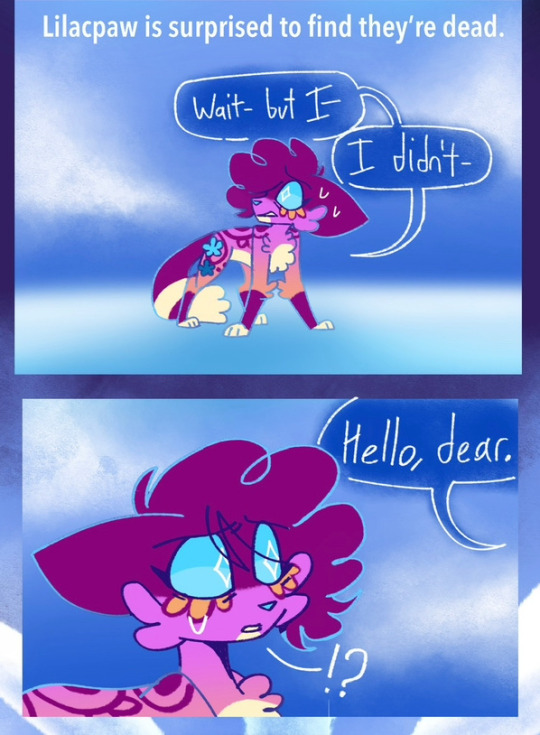
(plus the sky is also just generally a very..incomprehensible, mystical, “larger-than-life” powerful force to look at, especially when you’ve got 0 light pollution and look up to see a whole wide galaxy of beautiful unknown above you each night)
Perhaps the souls of their loved ones can even grant gifts and boons, or even curses, since the spirit of the wilderness and the sky is woven everywhere, and can surely influence the movement of a log, the calling of rain, the way of the winds, and maybe even the sickness of the land. Nonetheless, the wilderness takes lives as it gives food and water and a home, they believe this to be an entirely natural cycle. The wilderness gives, the wilderness takes, the wilderness eats and devours whole, and when you die, you’ll fly up into the sky, where you might even get to speak with your loved ones again someday, either through random sightings in the woods, in dreams, or intentional astral projection in more…energistically charged locations.
Even the Saint Tines don’t believe in The Glow as a person, but nonetheless a more congealed, solid entity than what the clan cats believe. It is a force of nature as well, but a specific one. The force of decay, of sickness, of life, of glory and triumph in living, that is hungry and gluttonous and never satiated. In AphidClan, you’ll never have to prove your worth or character to the way the winds blow, but to a Saint Tine, if you are impure enough, the Glow shall eat you whole, and you shall rot for all of eternity (and this is a bad thing). It is a strict and demanding force that will punish the unworthy and the impure. It is all very morally attached, very heavily wrapped around the idea of sin and repentance and innate existential value. The Reverend has a very large influence over the doctrine and the opinions of The Glow, as its speaking voice and the head of the church. (In reality, “the glow” is just the nuclear radiation they saw in the power plant the colony used to live in, before the power plant horribly collapsed for reasons unknown.)
In that way, the Saint Tine Church is a closer analogy for a Christianity-like religion, while Aphidclan’s beliefs are closer to that of general pagan spiritualist beliefs. The Saint Tines are a god-fearing people, while Aphidclan just believes in the innate spiritual power of the earth and the universe, who would be confused by the idea of a central god or entity controlling the name of the game.
As for Pearlstar, I think like…they’d be totally chill with pronouns, names, or titles that call back to the spiritual nature of the wild in some way or another, and in fact, it’s already a common thing interwoven into the culture. I mean, they call their designated spiritual leaders of the colony “star,” to honor their leader’s connection to the spirit realm and their initiative to walk between both worlds. If anyone is expected to revere the spiritual and integrate it into their daily life and identity, it would be the spiritual leaders of the colony. Cats are given prefixes and suffixes to reflect aspects of nature that they see themself reflected in. If names are viable territory for integrating the wild, the natural, the spiritual, then why not pronouns? A cat with breeze/breezeself pronouns is respected as a reflection of the wind, a cat with star/starself pronouns is respected as a person with a strong connection to the cosmic aether and the universe beyond. I imagine their kintypes work under similar beliefs as well, as the creatures or entities or energistical forces they see themselves very strongly in. A cat could tell their clanmates that they believe they were once a bird, and feel such a strong connection to flight, to soaring through the air, the clouds, the breeze on their wings, and that before their life as a cat, their soul once resided in an avian animal, and that’d be a common precedent that would totally work with the general cultural belief system.
So to summarize, glow/glowself pronouns would definitely result in getting odd looks and judgemental comments from Saint Tines (not Aphidclan cats though), but star/starself pronouns are totally normal, common, respected, and even a little expected in Aphidclan, and are…pretty much on the same level as giving yourself leaf/sky/cloud/tree/growth/breeze/etc. pronouns. S’just another factor of one’s identity that the wild may influence and make its home in, as it often does
#‘haha yeah funny joke!! [[YOU HAVE UNLOCKED LORE/WOELRDBUILDING INFODUMP NM. 5]]’#*worldbuilding#aphidlore#aphidasks#clangen#wc clangen#wc#warriors#warrior cats#though I’m sure Pearl had his star/starself pronouns before he was promoted#Star/starself pearlwish shocked to find out that he’s gonna be called Pearlstar now
80 notes
·
View notes
Note
You say you're pro Jedi, yet you're ALSO saying that Jedi are "corrupt from the war", "they refuse to change their ways", and "they're arrogant", which is VERY typical arguments from a certain crowd that are against the Jedi. You're no different from that crowd. Just say you like Anakin and go. I'm so tired of seeing the same arguments from THAT crowd that you are using also. If you say that about my people who have embraced their culture and practiced Buddhism for many years now, I won't forgive you. We've already been made fun of by many ignorant Westerners now.
Hi Anon!
(Their question refers to my 3 post series: It's Okay to Love the Jedi and Anakin at the Same Time)
My question is: why is it so hard to believe that all of these things are true? The Jedi are corrupt from the war. The Jedi have become arrogant. They do refuse to change their ways. And I am still pro Jedi, because I love them.
First, though.
I think it's very important to clarify:
The Jedi religion is not the same thing as Buddhism.
Yes, they're very similar in many aspects. Obviously, George Lucas was deeply inspired by Buddhism while creating the Jedi, and their ideology is heavily based on Buddhist beliefs and teachings. However, you cannot claim that my criticism of the Jedi is in any way a criticism of Buddhism, because the (very few) aspects of the Jedi belief system I actually do criticize are not aspects of Buddhism at all. The vast majority of what I criticize about the Jedi is not a criticism of their philosophy though, it is a criticism of their actions– actions that George Lucas specifically chose for narrative purpose, to create a system on the brink of collapse.
I have great respect for the Jedi philosophy and Buddhism in general. Buddhism is actually a religion of my personal ancestors– my grandmother is Japanese and was raised with Buddhism and Shintoism. So Buddhism is a part of my cultural heritage and I grew up learning a lot about it from my grandmother.
Re: "Corrupt from War."
When I discuss the Jedi being corrupt, I realized it's important to clarify which definition of corrupt I am using. So from the Merriam-Webster Dictionary:

The Jedi do not (to my knowledge) engage in dishonest or illegal behavior, and they are not bribed or induced to engage in wrongful behavior. So the definition I refer to is definition C: a departure from the original or from what is pure or correct.
The Jedi are meant to be peacekeepers. They literally call themselves that. The fact that war breaks out at all means the Jedi have finally failed. On top of that, many Jedi became Generals in the war that they could not prevent.
Ahsoka Tano beautifully sums up this problem:
"As a Jedi, we were trained to be keepers of the peace, not soldiers. But all I've been since I was a Padawan is a soldier."
The Jedi, in an effort to protect the Republic, depart from their original purpose as peacekeepers, and in doing so they have corrupted themselves.
This is exactly why Sidious' plan works so well.
Order 66 is not the revenge of the Sith, it's just the end of it.
The whole revenge of the Sith is the Clone Wars themselves.
The Jedi are forced to become something they're not, forced into situations that put their own morals to the test. And don't get me wrong, they still often come out with the moral high ground (<– haha).
Re: "They Refuse to Change Their Ways."
They do refuse to change their ways, and there's nothing inherently wrong with this! The Jedi philosophy has literally worked for thousands of years, and it's beautiful.
However, in regard to Anakin, I do believe the most compassionate response to his situation would have been to make some more exceptions for him once they decided he could become a Jedi.
Re: "Just say you like Anakin and go."
I don't just like Anakin, I LOVE Anakin– the literal main character of Star Wars. He's my favorite! But Jedi religion has helped me get through a lot of shit in my life (I've got chronic anxiety, depression, and deal with some trauma) and I love talking about it and analyzing it as a religion as well as the role of the Jedi in the Star Wars movies and other media.
Re: "They're arrogant."
"Too sure of themselves they are; a flaw more and more common in Jedi. Even the older more experienced ones." –Yoda, Attack of the Clones
Yoda literally admits the Jedi have become more and more arrogant. He does it in his usual, sweet, kind-of-joking manner, as a way to show Obi-Wan he might be falling into the trap of arrogance, but Yoda isn't making something up just to teach Obi-Wan a lesson. Many Jedi have become far more arrogant, and Yoda has noticed it.
And look.
The Jedi do have every right to be a little arrogant. They kept peace for 1000 years, the Sith have been dead for 1000 years (or so they believe). They are at the height of their power, and the Republic is (seemingly) thriving.
Re: "Being made fun of by ignorant Westerners"
Going to be honest, that's really messed up and I'm sorry you've gone through this! As someone who tries to embody the Jedi teachings myself, this is very upsetting to me regardless of whether you're describing people making fun of your Buddhist or Jedi groups.
People all over the world could benefit from Jedi wisdom. If we were all a bit more like Jedi and tried to be more compassionate and understanding of each other even when we disagree, the world would certainly be a better place.
And finally…
I'll once again state how much it saddens me that we cannot be seen to be critical of the things we love, lest we be branded a "hater." I understand there are real haters out there who use these arguments, but honestly, if they are using these specific arguments, they aren't wrong, and they're good arguments because they're actual facts of the story that help drive the plot.
However, these facts aren't supposed to make anyone hate the Jedi. They're supposed to show you the tragedy of the Jedi, how these beautiful, compassionate people had their own nature used against them by the Sith to basically destroy themselves– or at least put them in the perfect place for annihilation.
Had the Jedi been perfect, Sidious never would have been able to get the upper hand on them. He wouldn't have been able to hide from them so well, or even start the Clone Wars.
The Jedi literally have to be flawed for the story of Star Wars to happen. George Lucas designed it that way.
If anyone has any follow up questions send me an ask!
#asks and answers#you can love things that are flawed#just because something is flawed doesn't make it bad#the jedi are beautiful#buddhism#jedi order#the jedi order#flaws of the jedi order#jedi critical#Jedi#Star Wars#anakin skywalker
21 notes
·
View notes
Note
Imo there is not enough Valyria content out there so I would LOVE to see your thoughts/headcanons on what the geography, city, fashion, etc. looked like
okay this ones a little difficult because even though Valyria is clearly inspired by Rome, I don't like roman (aka greek) architecture for them it just doesn't really fit to me. Honestly its hard to assign any real life inspo because the existence of dragons would have had some major impact on the society as a whole, architecture included
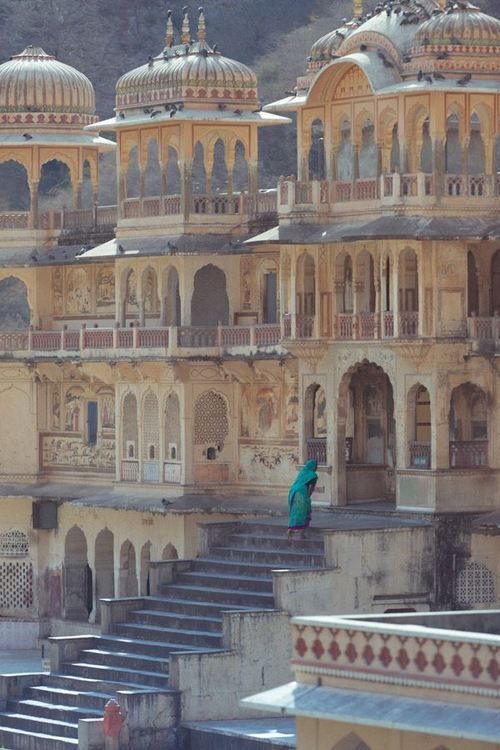
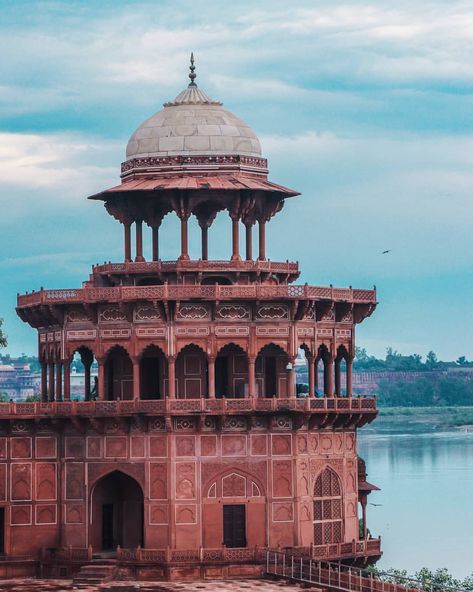
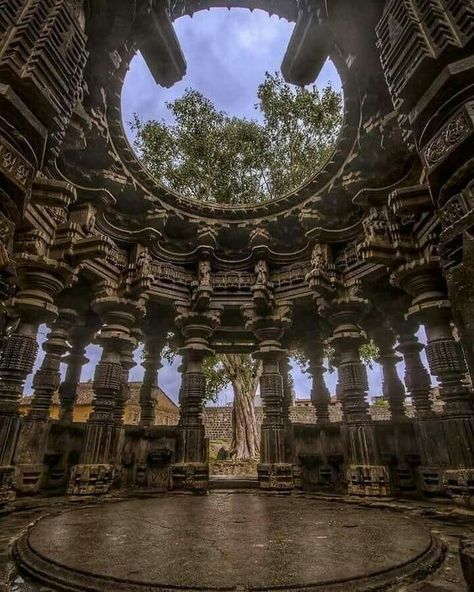
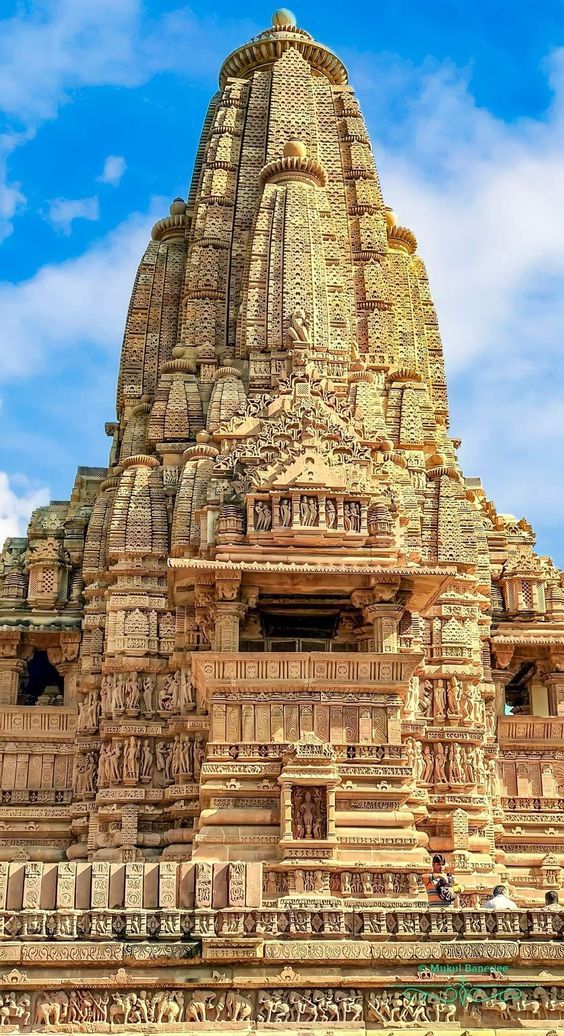
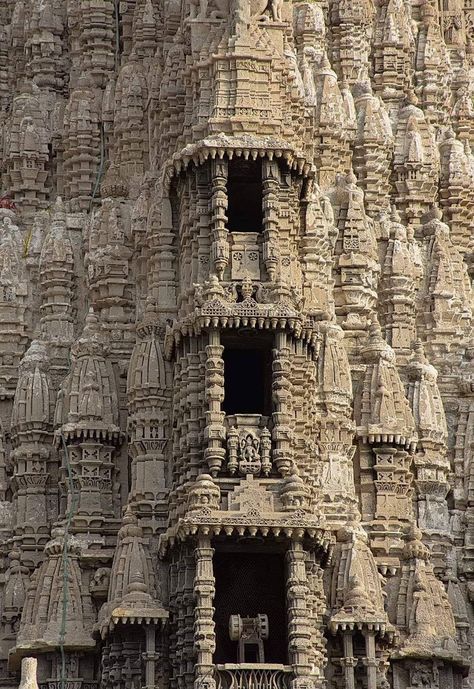
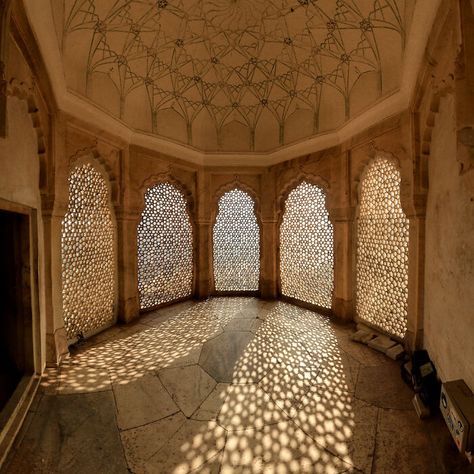
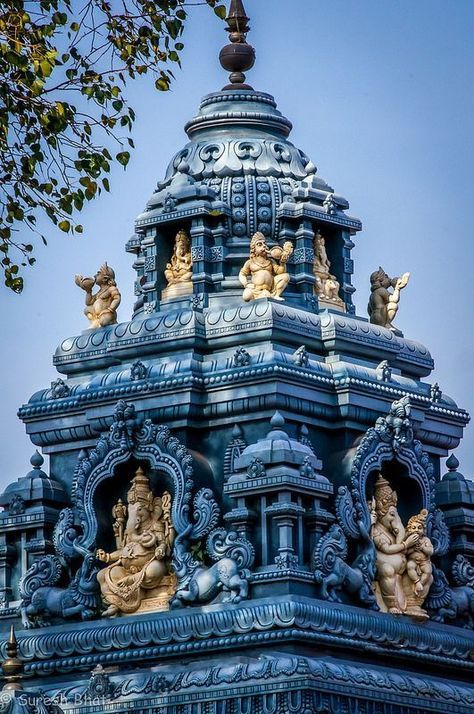

However, if I had to pick a type to ascribe to Old Valyria, my first choice would be a twist on Hindu architecture. I am absolutely obsessed with the sheer amount of details on the buildings (especially the Meenaskshi Temple at the bottom, everyone please go look at more pictures of it it's gorgeous). It's incredibly complex but also tends to be very symmetrical, the styles perfected over hundreds and hundreds of years. I also really love the idea of the spaces being open and well lit, it fits well.
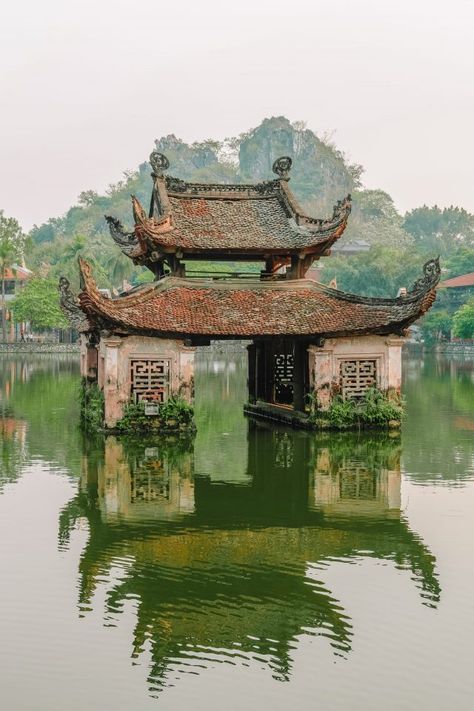





Another alternative is traditional Chinese architecture, with the added bonus of dragon motifs that are already there :D Another type of architecture with an intense focus on details, symmetry, and how the design of a space affects a person. Architecture is a reflection of where a society is in their development, and I find that this could be a good inspiration for Valyria, an advanced culture with the excess time and resources to build things like these.
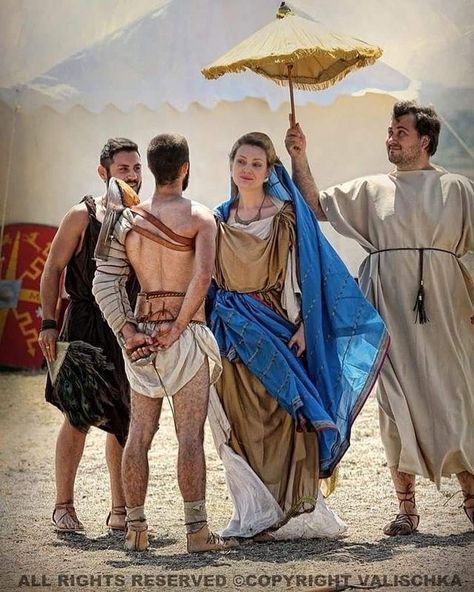
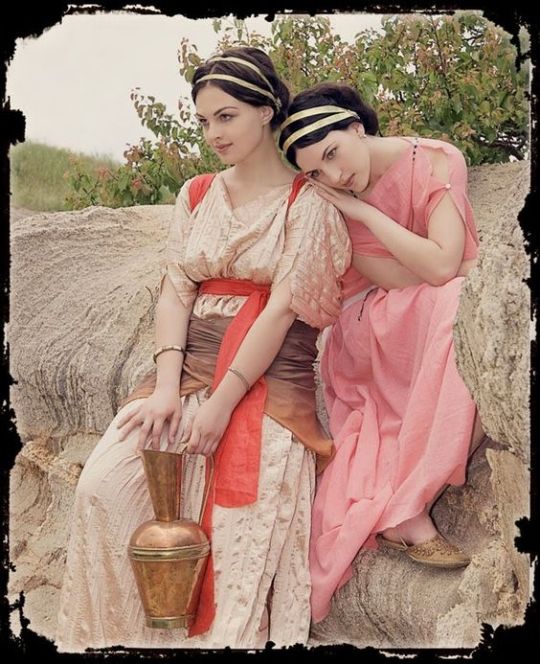
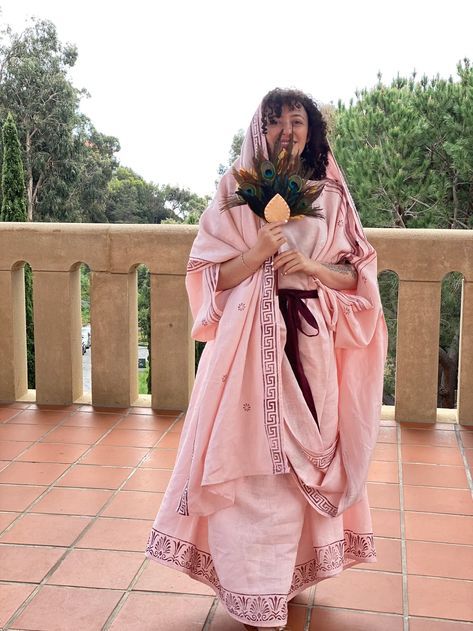
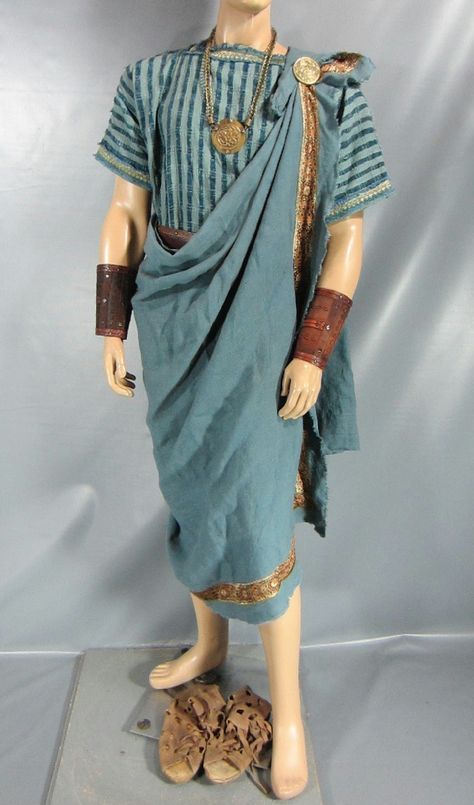
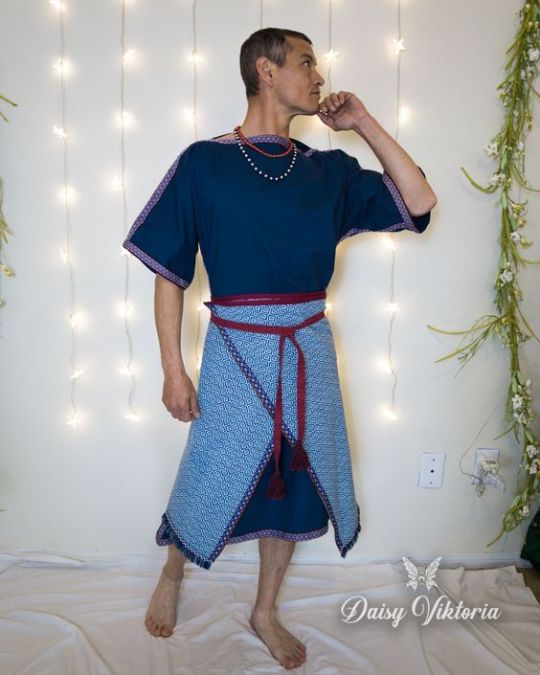
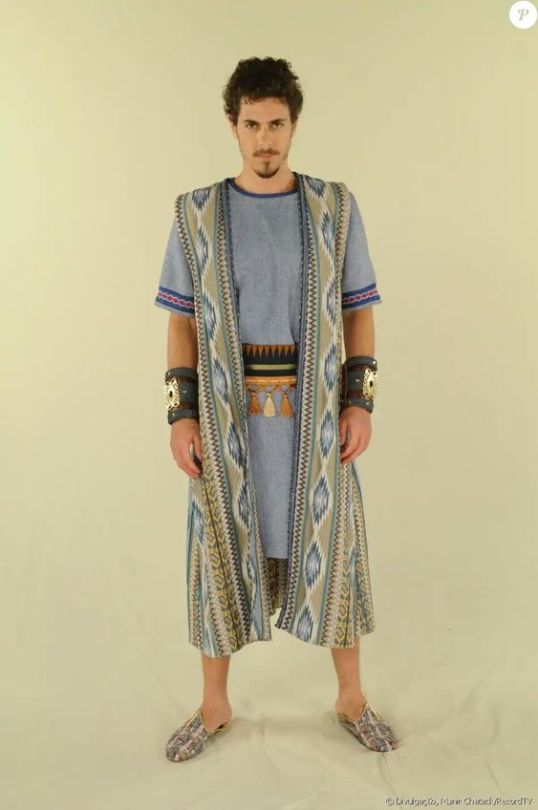
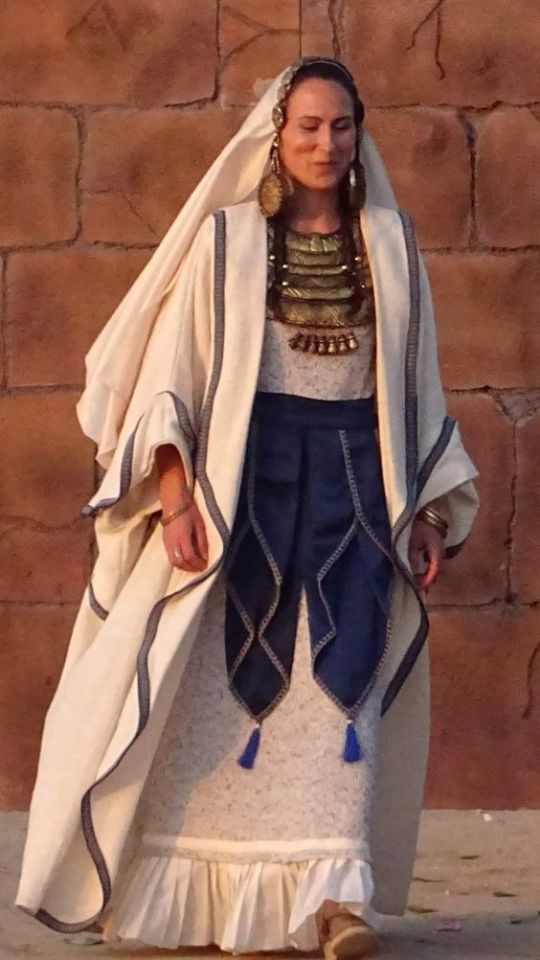
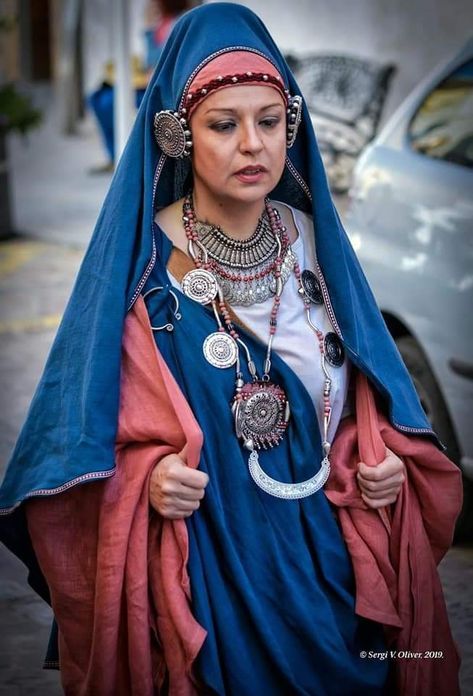
Woof okay clothing is all over the place I need to brainstorm and tighten my focus on different inspos (also I wish I could draw well so I can blend these styles properly but alas...anyways we ball). The main thing is mediterranean cultures I know that much. The Iberian Peninsula, Rome, Greece, the Minoans, Malta, Cyprus, etc etc all the ancient clothing and traditional costumes from around the Mediterranean Sea. Valyria was in a warmer, damper climate, meaning lots of loose fabric that could let air through but wouldn't weigh you down. Also doubling as shields from the sun. You get the gist I use this type of clothing all the time.
Okay Random Cultural Things Time
Art and literature? honestly really important because while yes this was a conquering civilization, they needed their exploits to live on in wall frescoes and written epics and dramatic pantomimes. I think they were literate, and probably spread written Valyrian to all the colonies, so that they were easily assimilated. People particularly fond of their dragons had pictures of them made and statues sculpted so that they would live on after their death.
Sports and entertainment also pretty big as well. Valyrians were a highly competitive people To Me so I think that riding, swimming, wrestling, racing, and other games were popular with the people, even those in the higher classes. Also fuck it I bet they raced their dragons. A really tall amphitheater where rich men lost money as they watched dragons circle around the ring. Or fight in midair, if the dragon riders were prisoners or sentenced to death.
As for religion, the Valyrians worshipped the gods that gave them dragons, but also tolerated the other faiths of the places the conquered, just in order to ease tensions (and because they had no dragons so why would they worship dragon gods). I like the idea of Roman household gods, with small altars in every home. Statues of the gods of the home, along with any gods a particular family might favor, along with ancestor veneration and dragon veneration. Dragon skulls and dragon masks on the walls baby!
#woah this was really long#spent my entire women and gender studies class doing this sorry Judith butler#asoiaf worldbuilding
95 notes
·
View notes
Note
[*Presents 9 questions to you*]
(As always, take your time! I hope you like these. :])
——————
-If Dysphia doesn’t have many vocal languages, what other types of communication do its creatures use?
-What are Dysphia’s satellites like? How many does it have?
-how is a Dysphian’s life cycle? For how long do they live in general?
-Are Dysphian offspring precocial/independent or altricial/dependant?
-Are Dysphians oviparous, viviparous or ovoviviparous, or do they have some other way of producing offspring that is completely different from anything we know of here?
-How did Dysphians evolve sapience? Why did they develop it?
-I have noticed that a Dysphian’s eye is quite unique in design… how exactly does it work?
-Did the ancestors of Dysphians have more than three pairs arms?
-and lastly… WHERE IS PSHI’S MOUTH??? and how is its design, exactly? (that slender little barbed, segmented tongue-like structure was the first thing that caught my eye on your silly clown outfit Pshi drawing lol)
——————
Oof I had to restrain myself from asking more…
And even more now that I saw the names Keikitan and Xeda on your original planet spec bio list 👀
My interest is now EXTREMELY piqued.
-(when I say dysphians, I'm referring to Pshicha’s species, but I'll touch on other life forms as well)
-vocal forms of communication aren't common on Dysphia but they are present, mainly in large aquatic pack hunter species and on land. The most common forms of communication on Dysphia are chemical communication (pheromones) and visual communication (biolights, body language, texture/color shifting, and the such).
when it comes to Dysphian cultures, there are three types of languages you'll come across: digit languages (sign languages primarily spoken with the digits of the first and second pairs of limbs, but details can vary greatly), full-limb languages (sign languages that mostly involve full limb gestures, they are more common and their complexity varies with the amount of limbs involved), and languages which are a mix of the two. (i will expand on that, for this topic is large and i yearn to expand on it).
-Dysphia has 5 satellites! but the biggest among them is just a little smaller then earth's moon and is comparatively further from dysphia then our satellite. because of that, the tides on dyphia follow a quite chaotic cycle. (i can't expand more on them at the moment but be assured they will have post dedicated to them alone).

-About the dysphian life cycle and reproduction i made a separate post, you should be tagged there :]
-Although like with human sapiens, the answer is not clear, but a big factor was how and where they started to build settlements during a series of cataclysmic events that required almost total isolation from the outside world, it forced them to get creative, religion also played a part in that whole ordeal.
-The dysphian eye design serves multiple purposes and belongs to their genus. The ancestors of this genus evolved primarily in the deep, where it is dark and having good vision is a big advantage. To see more prey, to see more food. And their genus in general is more intelligent then others dew to a couple more factors. (I will explain them in depth in the future)
-Yes dysphian ancestors had more arms, they also were a little flatter and some of the arms were fused to form sorta-fins :]
- there's pshi's mouth... and a couple other things..

The tongue is also the olfactory sensor!
===
Xeda and Keikitan will follow shortly! Im still developing them ;-;
GAAAAAAHHH I LOVE THEM SO MUCH MY SHRIMPYS

#my art#planet dysphia#spec evo#original alien species#spec bio#speculative biology#speculative evolution#ask
28 notes
·
View notes
Text
Sumeru's war on Nietzsche (part 1)
One of the main themes of the Sumeru chapter is the victory of altruistic values over egoism, specifically the egoism in Friedrich Nietzsche's philosophy.
I want to point out these connections so we can agree from the getgo on Nietzsche’s presence in the chapter:
Kaveh defeats nihilism in Parade of Providence, and the defeat of nihilism is one of the main goals of Nietzsche's philosophy
Achievements in the Khvaena of Good and Evil quest are named after Nietzsche quotes
Sumeru is mostly inspired by India, Iran and Egypt, and Nietzsche had a bone to pick with the philosophical influence of all three in the west
The themes of egoism and altruism are explored through the work of western philosophers and the philosophy of eastern religions, following the real life historical interrelation of both. And because the outcome of this confrontation favors altruism more, I also think it can be interpreted as a rejection of western values of individualism as a whole.
Nietzsche has the leading role for this analysis for clarity's sake (or else it'd end up in 15k words) but the philosophical material used in the region is vast and varied.
Egyptian influence
Nietzsche blamed Egypt for influencing Greek philosophers like Plato (public enemy #1 of Nietzsche) in his conception of goodness. Philosophers of ancient Greece would go on to influence western philosophy and institutions.
Nietzsche thought that developing the idea of objective goodness which one should aspire to and be governed by is where the ancient Greeks went wrong as a society, disrupting the balance between the rational values of the god Apollo and the frenzy of the god Dionysus that made ancient Greece an ideal society in Nietzsche's eyes. The clash of order and chaos is what made Greek culture rich in his opinion, so introducing a code of ethics ruined the dichotomy.
This concern with goodness was of course Plato's fault, who most likely was influenced by the Egyptian concept of Ma'at. Ma'at can basically be understood as a moral principle that guided both Egyptian society in its religious beliefs and its institutions.
In Genshin Cyno’s character is inspired by the god Anubis and one of his main motifs is the scales, his personal drive is also the pursuit of justice and order. This is likely because in Egyptian mythology Anubis weighs the hearts of the deceased against the feather of Ma'at.
So here we have the character inspired by Egyptian culture who personifies the ancient concept of morality that Nietzsche blamed for ruining a society he considered advanced.
Indian influence
The philosopher Arthur Schopenhauer was initially Nietzsche's role model, but he'd later become his biggest critic due to the ideas promoted by his philosophical system.
Schopenhauer borrowed elements from dharmic religions (Buddhism and Hinduism) to construct his ideas, mainly the concept of Brahma (a universal consciousness which originated all creation and it therefore presents the world as a unity) and the concept of desires as the basis of suffering (therefore desires have to be suppressed).
Nietzsche considered this philosophical approach to be pessimistic, arguing that it easily led into nihilism. He thought similarly about Buddhism (although he held it in higher regard than Christianity) for being a religion that denies the self and devalues the world, only considering it a transitory illusion that had to be escaped. Nietzsche aimed for the complete opposite: giving value to the world as it was and indulging in one's own individuality, independent from collective constraints.
In Genshin I think the concept of Brahma is close to the plot of the sovereign dragon Apep, who creates life that later goes back to it in Nahida's second story quest. Buddhist philosophy is covered in Wanderer's arc, which I analysed here.
Iranian influence
Iran and India share common ancestors, so their religious practices also have common traditions (such as the worship of nature), hence why they largely make up most of Sumeru’s inspiration. The ancient religion of Iran is called Zoroastrianism, things like the Akademiya darshans and the House of Daena are named after its religious principles, as well as the overall region where the quest Khvaena of Good and Evil takes place.
Zoroastrianism was founded by Zoroaster, who conceptualized the world as a conflict between good (originated by the creator god Ahura Mazda) and evil (influenced by the entity Ahriman) where humans have free will to choose between the two.
This cosmology would later influence the abrahamic religions (Judaism, Christianity and Islam) and, in Nietzsche's view, originate the western perception of morality he was critical of.
He used the prophet Zoroaster (known in Germany as Zarathustra) as his own character in the book Thus Spoke Zarathustra to voice his ideas of a new kind of man that could overcome this morality that Europe had submitted to under the authority of Christianity. This way, since Zoroaster was the one to introduce morality to the western world, so would he be the one to denounce it.
Historical context
The philosophical confrontation between egoism and altruism began in the aftermath of the French revolution, when European countries formed into republics. The threats of democracy, liberalism and socialism loomed over the aristocratic class and the societal status quo, which produced reactionary responses in the shape of individualism and egoism: the exaltation of the individual over the collective majority.
Nietzsche himself took part in (and built his ideas around) this reactionary response, he argued that the purpose of society was producing culture, which could only be achieved by the subjugation of one class to support the elites who could produce the art that the inferior class was supposedly incapable of producing. He denounced democracy, the egalitarian cause of liberalism and the class equality of socialism of attempting against this purpose, and he used the altruistic values of religion as a scapegoat that collectively addressed the three.
Nietzsche's philosophy
In this sense, Christianity was a method of control to suppress the individual from the basis of resentment —here's where the master and slave morality dichotomy he authored comes from: the subjugated class, in his theory, motivated by feelings of resentment and powerlessness against the elites, would develop values of humility, altruism and collectivism in order to morally place themselves above the “masters”.
For Nietzsche, this dominating morality was limiting and produced no worthy culture or arts, and without a purpose society was doomed to fall into nihilism (a state of being devoid of meaning). He identified the pessimistic approach of eastern religion (like the influence they had on Schopenhauer) and the slave morality of western religion as the culprits of nihilism, as well as the conformity of the “last man” (as he called it) who didn't aspire to anything beyond what was imposed on him.
Nietzsche's main existential problem with religion was the devaluation of the world and the individual, treating both as transitory towards a “beyond” where value was placed instead (Nirvana in Buddhism, Heaven in Christianity, etc), and he sought to return this value to life through the concept of the ubermensch (“overman” or “superman”): a man who would embrace existence as it is and redefine the values of society beyond morality with his own independent and individual values.
So, to summarize, Nietzsche “blamed” Greek philosophy (which was influenced by Egyptian morality) and Zoroastrianism (the ancient religion of Iran) for the Christian dominating morality of Europe, as well as eastern dharmic religion for influencing western philosophy and leading society into nihilism. In his view, religion (and its morality) was a method of control that had to be overcome to return value to the individual.
The setting of the Akademiya
The Akademiya's original Chinese name is Sumeru Institute of Religious Decree, which means it acts as a religious institution that treats religion and education as one and the same. This church of knowledge also grants power to its elite class (formed on the basis of academic merit) who rules the nation as an extension of the god of wisdom.
The Akademiya plays three roles of authority at the same time: spiritual, educational and political, all three which serve as a means to control and shape the values of the population. The Akademiya decides which knowledge has worth and which material is allowed to be learned, it decides which faith in which god has value or is allowed to be practiced, and it decides who occupies positions of political authority and who can access the education necessary for class mobility.
In short, the Akademiya is a form of governance that has the power to define and limit the values of society: its rules, beliefs, morals, ethics, hopes and even its dreams.
However, unlike Nietzsche's assessment, it's egoist values that dominate Sumeru under the Akademiya's guidance.
The culture of the Akademiya separates people into the ordinary and the extraordinary, those who live in submission and those who stand out. There is no community between scholars, only associations where each party must benefit for the duration of the projects they collaborate in, then they are terminated.

"Relationships are merely a byproduct in this exchange of interests. They may be pleasant and captivating, but they can only ever be secondary. When scholars collaborate to solve difficult problems, we freely share our knowledge and resources with one another, as if we were all kin. However, this collaboration ends after the results of our work are published. The reason is simple: We are scholars, and there are new projects that await our attention."
This type of association described in Nilou's story quest seems very similar to Max Stirner’s Union of Egoists, an idea he proposed as an antithesis to communal society where individuals conceptualized each other as “property” that either has or doesn't have use in one's life.
As Paul Thomas summarized, Stirner believed that “we should aspire not to the chimera of community but to our own “one-sidedness” and combine with others simply in order to multiply our own powers and only for the duration of a given task.”
Egoism and God
Max Stirner was the first philosopher to publish work on egoism with The Ego and Its Own in 1844, his influence on Nietzsche is contended due to the similarities in the foundation of their ideas.
It was Stirner who first presented the concept of the death of god, meaning that society could no longer hold on to religious beliefs disproved by the scientific advancements of the Enlightenment. Nietzsche would later coin the phrase “god is dead”, and both identify man as the killer, although Stirner argued that the god of religion had been replaced by the god of humanistic values and Nietzsche proposed for man to become god himself.
Here's Stirner's quote (The Ego and Its Own, 1844):
At the entrance of the modern time stands the "God-man." At its exit will only the God in the God-man evaporate? And can the God-man really die if only the God in him dies? They did not think of this question, and thought they were through when in our days they brought to a victorious end the work of the Illumination, the vanquishing of God: they did not notice that Man has killed God in order to become now—”sole God on high." The other world outside us is indeed brushed away, and the great undertaking of the Illuminators completed; but the other world in us has become a new heaven and calls us forth to renewed heaven-storming: God has had to give place, yet not to us, but to—Man. How can you believe that the God-man is dead before the Man in him, besides the God, is dead?
Here's Nietzsche's quote (The Gay Science, 1882):
God is dead. God remains dead. And we have killed him. How shall we comfort ourselves, the murderers of all murderers? What was holiest and mightiest of all that the world has yet owned has bled to death under our knives: who will wipe this blood off us? What water is there for us to clean ourselves? What festivals of atonement, what sacred games shall we have to invent? Is not the greatness of this deed too great for us? Must we ourselves not become gods simply to appear worthy of it?
Both likely drew from the work of Ludwig Feuerbach on religion as a projection of human ideals into divine attributes. For example, omnipotence reflects human desire for control and power, while omniscience reflects human thirst for knowledge and aspiration to overcome ignorance.
Sumeru’s ubermensch
The plot of the Sumeru chapter presents a nation in the aftermath of the death of their god, Lord Rukkhadevata. The political class struggles to accept the new god left in her place, as she's far from representing the ideals of wisdom they aspire to project on their archon, and thus fails to provide meaning for scholars’ quest for knowledge.

The sages then set out to manufacture an artificial god with their collective human wisdom, a projection of themselves in the vessel of a god, transcending all established ethical (and moral) boundaries.
The vessel for this artificial god has his own motivations, which in the fairy tale that stores his memories it's depicted as such:
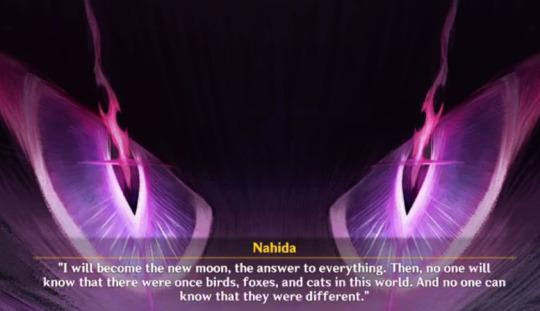
They essentially create an artificial ubermensch capable of redefining values, but the real ubermensch is found behind the artificial god itself.
Crime and punishment
Nietzsche called Fyodor Dostoevsky the only psychologist he had anything to learn from, as he was deeply influenced by the psychology of his novels —of which he read botched translations that didn't quite transmit the author's philosophy, but still.
The novel Crime and Punishment has a protagonist that represents the opposite of the author's beliefs, who happens to be quite similar to Nietzsche's idea of the ubermensch or the higher man. This character justifies his crime (a murder) to himself arguing that people are divided into the ordinary and the extraordinary, and the extraordinary have the right to commit crimes if it allows them to put forward their extraordinary contributions to the world.
From Crime and Punishment:
“Ordinary men have to live in submission and have no right to transgress the law, because, don't you see, they are ordinary. But extraordinary men have a right to commit any crime and transgress the law in any way, just because they are extraordinary.”
“...if the discoveries of Kepler and Newton could not have been made known except by sacrificing the lives of one, a dozen, a hundred, or more men, Newton would have had the right, would indeed have been in duty bound…to eliminate the dozen or the hundred men for the sake of making his discoveries known to the whole of humanity. But it does not follow from that that Newton had a right to murder people left and right to steal every day in the market.”
The protagonist sees himself as an extraordinary man, therefore, his murder is justified in contribution made to the world in exchange.
For Nietzsche, who sees life conditioned on the dominance over the life of others, a criminal is a man whose primordial human impulses to exercise power, which in the ordinary men have been suppressed by the dominating morality, have found an unconventional outlet through crime. Thus, a criminal is a symptom of a sick society that has domesticated itself out of its own nature.
The criminal as a glorified outcast, a rebel against modern society whose abhorrent behavior is a healthy instinct that denotes potential —at least symbolically, he wasn't calling out to people to commit crimes per se.
While Dostoevsky wrote the protagonist of his novel to struggle with guilt in the form of an illness and allowed him to find salvation in facing punishment for his crime, Nietzsche holds the criminal in high regard, seeing guilt as something beneath him.
This archetype is popular in media with characters like Hannibal Lecter, and indeed, many fans of the game expected Alhaitham or Scaramouche to fulfill it, but the character that truly embodies the outcast genius is The Doctor.

Dottore commits crimes against others to carry out his plans, never feeling guilt or shame. He was expelled from the Akademiya precisely for violating the ethical code all scholars are governed by and, as Nietzsche's ubermensch, aims to redefine the values of the world by collaborating with the Tsaritsa to “burn the old world.”
However, Dottore is the antagonist of the chapter, and the attempt at manufacturing the artificial god is depicted as an act of hubris, not a brave crusade against the restraining morality of religion. Furthermore, both the sages and Scaramouche face punishment (in their own way), something Nietzsche would disapprove of in an appropriate higher man.
Looking back on the Akademiya, the scholars seem to suffer under the culture of egoism and competition so well established in the institution.
They're often disoriented in their life, contrasting with the villagers who know themselves and their place in the world.
And the god the sages had dismissed as unworthy is reinstalled as the archon, maintaining the institution as it was while taking down the Akasha, the method of control of the sages.
Nietzsche’s egoism is rejected by the narrative, it raises and it falls in the course of the chapter, but what does this mean for the region?
Part 2 will examine how the narrative engages with the philosophies of altruism and how both egoism and altruism converge in the characters of Alhaitham and Kaveh
#sumeru#long post#genshin lore#posted some weeks ago and meant to cross post here the two parts together but i dont think its gonna be written in quite a while#main post
18 notes
·
View notes
Text
to show hospitality to angels
pairing: billy the kid x reader
warnings: discussions of religion (brief and light)
title source: hebrews 13:2. i think
a/n: hello ! i am not catholic and thus don't know protocol for catholic mass. generally im like religious lite so im really sorry if my discussions of God are sacrilegious in this, it's just how i conceptualize religion. also i don't think they are sacrilegious, im just preemptively apologizing
Billy was not a religious man, but that didn't mean he never went to church. Call it Catholic guilt, call it respecting his ancestors, but he made it to mass on Easter and Christmas and on rare Sundays if he was particularly missing his ma.
This particular winter morning saw him in the sanctuary for the Christmas morning service, doing his best to be still and silent. Though these holiday services were longer, he preferred them to the ones on Sunday – the church was prettier, decorated for the season, and there was usually more (and nicer) music. The choir stood behind the pulpit, though admittedly he wasn't paying much attention to the full picture, searching for one singer. Someone had a lilting soprano voice that made the world soft and a little fuzzy at the edges; maybe not trained, maybe not clean, but the kind of voice that played on the outskirts of memories of sleepy childhood nights. Through First Noël and Little Town of Bethlehem he scanned the right of the choir, but couldn't identify quite where the voice was coming from.
Then, for Silent Night, you stepped forward, a worn book of music clutched open to your chest as you gathered your red-and-green ruffled skirts. Billy had made the early New Year’s resolution to be a little more careful about falling in love, but the moment you began to sing he knew that was out the window. There was a slight tremble in your hands, betrayed by the fluttering paper and betraying your nerves at this solo, but your voice soared clear through the chapel anyways. Every worry Billy had went out the window – the cold and snow that were rolling in, the bounty still on his head, the insecurity of his whole life, all gone at the sound of your voice. There was only here and now, the sweeping melody wrapping around him like a blanket.
It was over in a second. The solo, that is. The feeling it had brought him, the peace he hadn't felt in God knows how long, remained for the rest of the service, until he was standing and scrambling to the front after the final prayer to talk to you.
“Miss?” He said, the brim of his hat crushed in his hands.
You turned, face soft and open. “Yes?”
“I just wanted to tell you that you got a real beautiful voice.”
A smile just about split your cheeks, now dusted with a pink blush. “Oh, thank you! I was so nervous, so I'm glad at least one person enjoyed it. I've never seen you here before. Are you new in town?”
Now it was his turn to flush. “I've been here a couple months. I don't make it to church as often as I oughta, I suppose.”
To his surprise, no judgement sprung up in your eyes.
“There's no set number of times someone ought to come to mass,” you said. “We all have lives. Church is always there when we need a break – or can take one.”
Such a sage statement coming from someone his age, maybe even a little younger, almost made him laugh, but it actually settled the nerves in his chest.
“I thought since you were in the choir, you'd be real pious,” Billy said.
Your mouth turned down in a conspiratorial smile, just this side of letting out a giggle.
“I slip out the back after we sing sometimes,” you confided. “I grew up a preacher’s daughter, and it seems more worth it to me now to go to church when I actually want to be with God, not just because I feel like I have to.”
“I like that,” he said thoughtlessly, and immediately felt stupid for the simplicity.
It earned him a toothy grin, though, and you brushed your hand against his arm.
“I have to get home now, but I would like to see you again. I'm a teacher at the schoolhouse in town, so you can find me there every afternoon.”
His surprise at your interest in him manifested in silence, and you dropped your hand in shame.
“I'm sorry, that was incredibly forward of me. If-”
“No! No, I want to see you again too. I'll come by the school on, say, Friday? If you're not too busy?”
“Not at all. Just tell me your name, so I know who I'm welcoming?”
“William,” he said, something about you making him desperate to be proper, then desperate to be honest. “Billy.”
“Well, Billy, it was lovely to meet you.”
You cast a glance around the room, then rose on your toes to press a kiss to his cheek before leaving to get your coat. What a strange tableau you would've created, he thought, had anyone seen you: the lips of a preacher's daughter on the skin of an outlaw. It was almost something out of a dime novel. It wasn't until you were surely long-gone that he realized he had never caught your name.
#repost bc tumblr was giving me mixed messages the first tjme#billy the kid fanfiction#billy the kid imagine#billy bonney#billy the kid x reader#billy the kid#billy the kid 2022#william h bonney x you#william h bonney x reader#william h bonney imagine#william h bonney#tom blyth x reader#tom blyth
80 notes
·
View notes
Note
As an atheist, I started making altars and offerings and praying to hellenic God's,and it's the first time I've ever felt something in a religion. Idk, to me, whether I'm a believer or kot does mot matter because the whole process feels very intimate, warm, and personal. When j make offerings, I feel very happy, when I dedicate something I feel happy, ots something that I haven't felt with my born religion, I was never curious about it, and it always felt forced. Maybe it is because some of my ancestors were hellenic and a lot of them Pagan. As someone who comes from a very non-believing family and charachter, I often tell myself 'why am I doing this it dosent exist' yet I at the same time, I enjoy it, so I do.
But while I enjoy doing it, I want to know soke your advice for this. I don't know how to properly pray or get close to the God I'm praying to. When I pray and talk I feel empty because I don't know if they are listening, amd I'd like tk know their presence, I don't know the proper way to pray, nor how to ask for help if I need so. I came here to you because it seems you've cultivated your relationship with the Gods, and I'd like to know how I go about it the same way, I feel very far away.
I’ve found that different types of people need to go about praying in very different ways. For me, I always light a candle, have my prayer written, and then say it aloud. Or maybe it’s one of those informal prayers where I just light a candle and sit with my eyes closed. It all depends and the gods know your intentions and what works for you. If you want to go about it in a very traditional way that’s great, and if not that’s okay too.
I was very agnostic before I dipped my toes into Hellenism and I came into this practice and religion with so much skepticism it’s ridiculous. But like you, I found comfort in giving offerings and praying to my deities. It was nice to talk to them about the things bothering me in my day to day life. How I feel closer to a god very much depends on the god.
Try to pick an activity you enjoy that also reminds you of a deity you feel close to/devote yourself to. Think about them while doing it, see if that gives you a better feeling than emptiness. That’s the last thing you want to feel. It’s also not wrong to simply ask for a sign.
And a sign can be anything. But once you see it, you’ll know and have an “aha!” moment. I find that with a lot of people that they’ll think something is a sign and then say “oh but maybe it was just a coincidence?” But so what if it was? Lol. It gave you that jolt of recognition and immediately made you think of a certain god, no? I think that’s special too.
Tell them about this feeling of emptiness you have, talk about how it makes you feel and what you personally think is making you feel that way. They’re here to listen to you. Choose an offering, literally anything, light a candle if you want to, and just.. talk. No formality or anything like that if you don’t feel the need to be formal. Just talk.
I hope things work out and get better for you 💞 the gods are always listening.
#deity worship#hellenic polytheism#helpol#deity work#hellenic worship#hellenic polythiest#hellenic devotion#greek deities#hellenic community#hellenism#hellenic deities#hellenic gods#hellenic prayer
24 notes
·
View notes
Note
I tried telling ppl months ago that Tish or ppl close to her was on here and was called a liar etc. After that whole IG vs Tumblr and posting all the rumors, assumptions, and accusations on fan pages Tish follow, I knew she/someone would tell/show her, and be discussing it. The same ppl mad at IG are some of the same ones on here that have IG accts and follow Tish and a few fan pgs. I wish she hadn't have created another pg, or opened comments. These ppl don't care about her as a person. They're lusting after, roasting her, sexually harassing her, and creating ai sims porn, and other ridiculous edits etc.(Taylor Swift has a lawsuit for fake porn created of her. Yall need to chill.) I've been rooting for Letitia for a while, but it doesn't seem she's as excited, optimistic or professional as she once was. She's been falling for about a yr or so. She really needs to get back to her faith. She's slipped which many Christians do, but that happens because we're NOT perfect humans, nor are the ppl that have so much to say about her, and question her. They themselves can't be the angel they expect and think she's suppose to be.
I still wish the best for her and hope her spiritual discernment and eyes will open.
#Someone that cares about Letitia more than she'll ever know
She’s a celebrity and an attractive human so people from all walks of life have eyes on her. I can confidently say no one from the tumblr space is disrespecting her or putting inappropriate comments on her accounts. Most of us are waaaay too grown for shit like that. And making chats/simulations with cartoons is a different beast than actually using HER likeness to make pornography. No one expects Tish to be perfect and I’m glad she made the dump page because she needs to keep up her exposure and some kind of connection to her fans. I think she’s in here and other sites but I also think she saw how hard her fans rode for her with the movie recasting situation and realized she has a great fanbase and needs to cultivate that more.
As far as the religious stuff, I wouldn’t know. Her spiritual journey is hers and hers alone. I don’t personally support or participate in any organized religion. It’s hard to support something that glorifies suffering while being used to prop up those who oppress us. I cannot pray to the same god who allowed my ancestors to be enslaved, abused and continues to allow these same aggressors to diminish and discriminate against us daily.
At what point does god step in?
At what point is it enough?
People typically believe in a religion because they need to stay sane, they need something to believe in because they are in pain or their lives are disharmonious.
Most people who can wake up and do whatever they want don’t typically believe in higher powers.
Religion is reserved for the poor and downtrodden to keep them subservient to those who are actually currently enjoying the Earth(wealthy people) the Bible claims the “meek” will inherit. 🤷🏽♀️
#letitia wright#letitia wright fanfiction#letitia wright x black!reader#woo’s asks#no religion#christianity
22 notes
·
View notes
Text
From no belief in particular to Helpol
Just because I find it interesting that so many helpol people and pagans in general seem to be ex-biblical religions, here’s a slightly different story for you.
I never grew up religious. My dad is actually very anti-religion because of the sheer amount of people who use religion as a weapon to discriminate, and the way many churches can become almost like a tiny cult. But my mums side of the family is Italian Christians (don’t ask me how my parents were even together at one point because I have no clue). So on one side I had my dad telling me to never trust a pastor and that he’d never let me set foot in a church and my Italian grandparents going all in on Christmas family reunions with the nativity scene set up and crosses on all their cards and church Christmas morning.
It made me very neutral. I didn’t care what existed, I was just a kid who was exited to pick grapes on our vineyard (which looking back, the fact I lived in a vineyard and made wine is very,,, hello Dionysus) and get days off school for Christmas holidays etc. I didn’t believe in the Christian god, but as a kid I did believe in an afterlife. I think because it’s easier to process that as a kid than death being just nothingness.
In primary school, we did a whole term in Greek mythology. My first ever myth was echo and narcissus and I still have the painted tea towel I made with echo on it for the art potion of that class. I got very obsessed, very quick, as undiagnosed autistic kids do. I loved mermaids and sirens, nymphs and the sailing part of all the war myths. I’ve always had this deep link to the water, not just the sea but rivers and lakes, any water you can swim in. You’d think I’d end up a Poseidon or Aphrodite devotee because of that huh? Point is I heard the Greek myths young, and because those myths also have Roman equivalents, when my Italian family heard I was obsessed I’d get the Roman version of the stories from them.
For years I was just mythology obsessed with no particular beliefs. I didn’t like how hardcore my Italian family was in their ‘everything is a sin’ mentality and I also felt it was a bit mean of my dad to say every single religious person is a monster. As I came to realise I was trans and bi at around 15, suddenly I was privy to the sheer amount of queerphobia in religion. Turned me away from most of them hardcore. But by the time I was 17, I’d stumbled on the reason those shops with the crystals and little mythology statues exist. Because the old gods of mythology were still worshipped.
I don’t actually remember when I got claimed by Hypnos, but he definitely claimed me. I’d always liked him as a concept because he’s much more chill than some of the more intense gods, but he slowly started creeping into my life when I’d see something and go ‘Hypnos would like that’ or I’d jokingly be like ‘I’m so tired, knock me out Hypnos’ and I WOULD fall asleep easier that night. I can’t exactly explain why, but I’ve got this deep connection to the river Lethe as well. Although not in the sense Lethe is a god, in the sense of its connections to Hypnos. Like there’s a siren of the Lethe inside me screaming to go back home.
In all honesty, there was never a solid moment I was like “I’m helpol now” it just kind of happened. The gods, especially Hypnos snuck into my life back in primary school and slowly made their presence more and more known over the years. And I was fine with that, because this is what my Roman ancestors would have been doing, and this is a religion that doesn’t hate me for being queer.
This got long, I’ll cut it short here. But that’s a perspective from someone who never grew up religious for you.
#hellenic polytheism#hellenic deities#hellenic pagan#hellenic worship#hellenism#hypnos devotee#hypnos god#greek mythology#hypnos deity#cthonic gods#hellenic polythiest#hellenic polytheistic#hellenic gods#hellenic community#helpol
30 notes
·
View notes
Text
Arkhelios Adventures

"Our Proxy's name is Simon Klein. He's been Proxy my whole life," Brion continued. "He's very strict about the rules and what will earn the Watcher's favour. On paper, he's a good leader, but there's just something...off about him."
"Maybe because he's been married multiple times and each time, his wife's age gets lower while he gets older," Sebastian called out. Theo smacked him on the arm as punishment, but Brion didn't seem offended by the outburst.
"You're not wrong," Brion agreed. "His last wife died suddenly from 'complications of childbirth' and just days later, Simon remarried to 'help bless' his new wife. Ghastia Krone desperately wished for a child, but she was nearing the end of her childbearing years. So the Proxy married her to give her a child out of the kindness of his heart and to help grieve the loss of his latest wife, or so the devout believe. I'm sure this wife would have also been dead within three years had calamity not fallen on us."
Sebastian nodded his agreement, but remained silent. Brion's words stood on their own without the need for someone to verify them. Simon Klein was everything Brion had implied and more.

"Helena and my parents went to see the Proxy when he had a moment to spare. Helena told me that she was so nervous that she thought she'd faint when she saw him, but somehow she endured.
Our mother complimented him and thanked him for generously making time to see them on such short notice, oblivious to her daughter's distress.

Simon played the part of devoted religious leader well. He welcomed them to sit down in the living room where they could talk about any questions Helena had about the supernatural, but in a way that made Helena's skin crawl.

Apparently, Helena saw that same doubt in our father's eyes. There was something in him that wasn't like our mother. He was a devout Jacobean, but something in him viewed the Proxy with suspicion. You could have all the faith in the world, but if your leader is immoral, you can't fully commit to the religion until he's removed. At least, that's what I think anyway. Our ancestors overthrew a corrupt monarchy to follow the Watcher, so I think we have that same duty if the Proxy can't serve in the way he's meant to.
I'm not sure exactly how this next part went. Helena was hysterical when she tried to tell me what happened. Between her crying and my mother's frantic calls to Uncle Trysten, I think this is what happened:

The Proxy sat down with my parents and Helena to discuss the possible sanctity of werewolves, while Ghastia made dinner for her husband.

Simon began to speak about how werewolves were unholy, unnatural creatures that were beyond redemption, while Mom nodded along happily. Helena could barely focus on his speech because she could feel his eyes looking at her in a way that was improper. Mom seemed oblivious like she always seemed to be, but Dad looked like he shared Helena's discomfort.

Helena said that he stood up, looked wildly around the room and declared,"

"You can't have my daughter! I won't let you make her your next victim!"


"And then collapsed on the floor without another word. They tried everything to wake him, and Mom and Helena are both expert healers. If they couldn't help him, no one could. He kept murmuring quietly about protecting his daughter for maybe half an hour and then fell silent. It was like he was reliving a nightmare over and over.
As the hours passed, he remained unresponsive. A thin film enveloped his eyes, which would have likely blinded him had he been conscious. He stayed like that for almost a day, after which his body began to stiffen and become cool to the touch. His chest continued to rise and fall with breath, and his heart pumped blood through his still body, but by every other measure, he appeared to be dead.
The morning after Dad's sudden fall, the Proxy was found motionless on the ground by his wife. He had the same symptoms, though he succumbed much quicker. The film over his eyes was thicker and his breathing more shallow.
We left after Mom succumbed and Uncle Trysten began showing the same signs as she had at the start of her illness. Aunt Deia begged us to take our cousin, Xaviere, with us to give her a chance of living without contracting the disease from our Uncle. Her younger half-sister, Desdemona, was too little to come with us on a dangerous trek to an unknown land and our youngest brother, James, was nowhere to be found, so we had no choice but to leave without them."
The government fell with its sacred leader unable to lead and in the past week, we sometimes overheard Mom and Uncle Trysten talking about different factions competing for control in the aftermath, but we didn't understand politics.
Helena had been planning on leaving to live with Phuong and possibly taking Abercius and I with her, and now we were trapped in our house with the only sympathetic parent we had slowly dying. It wasn't safe to leave the house for fear of this mysterious plague spreading, nor was it safe to risk running into competing factions who wanted control of Jubilant Accosts. Phuong's vampire aunt and uncle declared war on each other, leaving Phuong without a safe home. She hasn't seen her parents since the conflict started. A few days ago, we saw the same transformation start with our mom that our dad had suffered. Her eyes developed a film over them and she became lethargic to the point of barely breathing. We laid her down next to our father and said our goodbyes. Her eyes still flickered under her closed lids, same as Dad's. Having studied the body to learn how to heal it, it was Helena's guess that they were both in a deep sleep, so deep they shouldn't even be alive. None of the victims of this sleeping plague ate or drank or moved, but some sliver of life still remained with them.

Brion put his hand on Sebastian's shoulder to keep him from rushing off to go pack.
"So, a sleeping plague is potentially killing people in Jubilant Accosts?" Theo asked.
"Along with a power grab," Sebastian added. "Who knows what's happening there? I hope my dad and my brother are safe. This has to be why he was so determined to send me here this semester. If the Proxy is dead or dying, then no one is safe. I need to go back and help them!"
"No one's going back until we have a plan," he said firmly. "It does no one good to rush off and end up dead. We need support and we need a plan. The Watcher brought us Theo, but we need all the support we can get. Phuong needs somewhere safe to give birth and we can't return to a warzone where even if we win the battle, we could still lose our lives because of bigotry."
"My dad is strong and so am I," Sebastian replied. "We'll ask the coven here for help, but then I'm going back with you to find my family."

Adam couldn't stop the sinking feeling that he held a small piece of this puzzle, but he didn't know how it fit. A dream plague that was sweeping a nation? Surely the guardian of the dream realm could step in and....
In an instant, the answer came to Adam. A wave of guilt hit so hard that it nearly knocked him over like a sucker punch.
He did hold a key to this mystery after all. It was all his fault.
Adam dashed from his hiding place to go find a certain book in the coven chambers, hoping to be wrong despite knowing that he wasn't.

"Did you know any of this, Sebastian?" Brion asked. Now that everything was out in the open, a weight had been lifted off his shoulders. "You must have left just days before this all happened. Maybe you saw something."

"I don't think so," Sebastian said slowly. "I know that my dad left for another work trip right after I left. I don't know how something like this could happen. My dad used to tell me stories of the Dream Guardian who protected us from bad dreams or nightmares. It was his job to protect us from endless sleep and make sure that we woke up in the morning. None of this could be happening if he's still watching over us."

"That sounds like a myth," Despina replied. That, or a bedtime story. There's no such thing as a dream guardian. He's just like the tooth fairy."
"The what?"
Theo ignored Sebastian and Brion's confused looks and cleared his throat to be heard.
"There might be a Dream Guardian, " he explained. "There's a dream realm protected by this scary princess that ties Jubilant Accosts with other worlds. Adam used it to break through the magical seal around Jubilant Accosts so that we could talk. Everyone alive sleeps, and in that protected realm, you can connect to other people if the princess allows you. Maybe she works with the Dream Guardian or maybe she is the Dream Guardian. She might have something to say about this sleeping plague since it is in her realm."
"Great!" Brion beamed. "Let's summon her then and ask."
Theo's face fell when he thought about the request.
"I don't know how to summon her," he admitted. "Adam was the one who summoned her last time. I don't think he's going to help me after everything that's happened."
"I can ask," Despina volunteered. "He may be a cheating asshat, but he's still my cousin. I'll get it out of him."

Despina stopped speaking when something glowing brightly in the night caught her eye. Brion was changing into a werewolf at the time the moon commanded him to and the rest of the teens watched in awe.
"So cool," Theo whispered to his boyfriend, and Sebastian nodded excitedly.
"I've never seen a werewolf change before. It looks painful, but like it's worth it. Check out his teeth!"

"Is it wrong that I want to pet him?" Theo whispered to his boyfriend, loud enough for everyone to hear anyway.
"Yes, but I kinda want to do it too," Sebastian replied back, earning a guilty giggle from Theo.
Despina rolled her eyes at her friends. Was she the only person focused on the problem at hand? A land was in trouble, suffering from a magical plague and Despina was determined to help fix it. Why else was she learning magic if she couldn't use it to help others?
Maybe she still felt trapped by the spector of her parents, but Despina wanted to, needed to prove herself to the world. She wasn't as powerful as Theo, but she'd nearly aced the entrance exam to the academy and nearly every teacher assured her that she was living up to her family name and their potential. If Jubilant Accosts was going to be saved, then Despina would be leading the charge while her friends got themselves organized.
#sims 2#sims 2 pictures#arkhelios adventures#tw: adult being creepy to a teen (implied)#Helena Pryor#simon Klein#ghastia Krone#alphaeus pryor#Damiana Pryor#theo bellamy#despina darktide#brion pryor#adam darktide#sebastian wall
7 notes
·
View notes
Note
My entire life, I've yearned for the kind of community the Jewish community and Judaism have provided me. I found out I had Jewish ancestry when I was a kid, I looked into it more later and realized my most recent Jewish ancestor (like three-ish generations back) was almost certainly forcibly converted out, and decided to convert to like. Make amends for that I guess and also because I really vibed with the holidays and how we turn up everywhere in history bc we keep doing cool stuff despite consistently shitty circumstances.
But I digress.
I have waited my WHOLE LIFE trying to experience the joy becoming Jewish has shown me, and that gets shit on constantly.
My sister has started making a truly obscene number of Jew jokes. My mom scoffs at all the 'nonsense rules' and has said repeatedly that she thinks choosing a 'restrictive' religion is dumb and I've made a mistake. She even said it's an insult to HER parenting skills that I would seek out religion after she tried to teach me to know better.
My dad is dead but I never ever in a million years would have told him even if he were alive, and my sister thinks it's funny to threaten to 'out' me as Jewish to his relatives even though they're basically KKK-adjacent so she actually enjoys threatening mg safety at this point. (Yay family right?)
My friends have turned everything into an Israel/Palestine discussion lately and I know damn well what they're doing when they start saying truly horrible shit about Israelis and looking at me. They get mad if I try to temper their extremism so I've given up. I barely talk to them anymore and I spend more and more time with other Jews from temple and I don't want to like. Isolate myself from all non-Jews I guess bc I've always felt like that leads to weirdness and perpetuates shit about Jews being unfriendly I guess idk?
Anyway I digress again. My point is I'm really sick of constantly being expected to tolerate it when people think I shouldn't be Jewish.
Other queer people think I'm somehow compromising my queer identity by being Jewish, leftists think I hunt Palestinian children for sport now apparently, right-wingers think I traffic good Christian babies for organ harvesting or some shit idfk, my friends think that if I'm not being more vitriolic in my hatred of Israel than they already are I'm some kind of secret rabid Netanyahu fan, my family think I've been recruited into a cult apparently and the only other people who show me even an ounce of compassion or regard are other Jews and Gd knows there's like ten of us and that number is unlikely to increase.
Just. Fuck. I've put blood, sweat, tears and money into this, I invested more time and emotional commitment into this than I have into going to college or choosing a career, I love it more than anything and have only loved it more the more I learned about it, and all I get when I express this or even just let slip that I am Jewish and chose to be, I get nothing but hatred. I will never understand how a religion that has spent all 5000 years of our existence minding our business and arguing about the same book over and over can possibly have offended this many people with our existence.
Dmn anon, that is a lot you're dealing with right now. I'm so sorry you're surrounded by people who clearly don't respect you. Because yes this is a lack of basic respect, and it is antisemitic. Now I don't know how old you are and how safe you are, but if you can safely do so, set very hard boundaries. Do not tolerate this amount of disrespect towards who you are. It is hard, and many of us have had to go through similar situations, as you can read all over this blog. But I think having to spend your life surrounded by people who make you feel unsafe and disrespected is worse. I know sometimes there are situations in which people cannot safely set these boundaries, I hope it's not your case, but if it is feel free to come here to vent again.
I know you don't want to isolate yourself from goyim. Many Jewish people don't want to. Sadly, when people disrespect us like this, they're the ones isolating us. It's not your fault. Seek people who love and accept you. Sadly, a good chunk of goyim won't - I'm not saying everyone, obviously, but a portion. Having a good Jewish support network seems to be more and more important, whether it's irl or online.
I hope you can soon be in an environment that's safer and more accepting
- 🐺
#jewish vents#antisemitism#leftist antisemitism#jewish convert#i feel like i need to clarify#while i said that a good portion of goyim are disrespectful and antisemitic#i dont mean every goy is#so if someone is coming in the comments to call me goy-phobic i assure you i do not have the patience to deal with that#i mean what i said#thats not an attack on goyim#its just an observable truth stated by literally every jewish person I've ever spoken to#if you feel offended at being called antisemitic try not to be antisemitic#like im sorry i sound so mad but i am just very tired of seeing my community suffer while everyone else just looks the other way
26 notes
·
View notes
Text
Varney the Vampire, Chapter 8: Checkmate Atheists
[Previous chapter] [Next chapter]
The party looks around the vault. It's spoopy in there, creppy even, and Henry and George are creeped out. Everyone begins to examine the coffins in the vault, only to find that the older coffins are so fragile that they crumble to dust with a touch. Finally they find a coffin plate with the name of the ancestor they are looking for, who is now named Marmaduke instead of Runnagate for some reason. It's been detached from its coffin, so they scan the coffins with no plate to figure out which one it came from. Eventually, they find the matching coffin; the death date is off by a century, but no one comments on this, so it appears to be a mistake by the author.
The coffin opens easily, and appears to be empty except for a few rotten scraps of cloth. Chillingworth confirms that no dead body appears to have ever been placed in the coffin, at least not one that underwent any amount of decomposition. This news is greatly disheartening to Henry, George, and Marchdale, but not to Chillingworth, who makes the bold claim that he would not believe in vampires if one bit him on the neck. He goes on to say that he also does not believe in miracles, because he believes every phenomenon has a scientific explanation.
The group leaves the vault. Henry remarks that his family is cursed by Heaven, which Chillingworth scoffs at. As they close up the vault and leave the church, Chillingworth attempts to counsel Henry, telling him that the best thing to do is stubbornly refuse to accept his situation, and get really angry instead. Henry comments that this approach sounds a lot like defying Heaven, to which Chillingworth replies that it is nothing of the sort, because if God didn't want us to defy our circumstances He would not have given us defiance in the first place. He then makes the mistake of saying all religion which cannot be rationally explained is merely allegory, and Henry straightens up and gives a moving religious speech, God's Not Dead style, which stuns Chillingworth into silence. The narrator then soapboxes a whole bunch about how religious people always win arguments with atheists because their arguments are so much more true and correct.
My god this chapter is wild. Can you believe the part where they break into a grave looking for a vampire is the boring half of this chapter?
Last time I commented that Henry and George seemed not to know how decomposition worked. This time, it becomes obvious that Rymer himself does not know how decomposition works.
"Some of the earlier coffins of our race, I know, were made of marble, and others of metal, both of which materials, I expect, would withstand the encroaches of time for a hundred years, at least." [...] When, however, they came to look, they found that "decay's offensive fingers" had been more busy than they could have imagined, and that whatever they touched of the earlier coffins crumbled into dust before their very fingers.
How fucking old are these coffins, Rymer??
Next we get a stunning display of just how much Rymer Does Not Care about consistency. First off, Runnagate Bannerworth has changed names - he is now Marmaduke. I don't know how Rymer bungled the name this badly. The name "Runnagate" is never mentioned again.
(Eagle eyed readers may note that I tagged Dad Bannerworth as "marmaduke bannerworth" a couple chapters ago. This is because Rymer later changed his mind on who Marmaduke is.)
The coffins in this vault consist of two layers, an outer and an inner coffin. The outer coffins are mostly wood, with coffin plates affixed to the top, while the inner ones are metal and have inscriptions engraved on them directly. The coffin plate and coffin inscriptions for Marmaduke Bannerworth are as follows:
"Ye mortale remains of Marmaduke Bannerworth, Yeoman. God reste his soule. A.D. 1540."
"Marmaduke Bannerworth, Yeoman, 1640."
Most probably one of these is a typo; I find it hard to imagine even Rymer forgetting which century a guy died in within the space of a single page. It could also be that he truly gave that little of a shit.
Chillingworth roots around in Marmaduke's coffin for a bit before dispassionately reporting that it contains no body, nor any signs of one having decomposed. It's at this point that the chapter really starts to get interesting, as Rymer takes Chillingworth's established character as a skeptic and dials it up as far as it will possibly go, culminating in a Christian-vs-atheist debate between him and Henry and a fairly lengthy editorial from Rymer himself. It isn't clear to me just what Rymer is trying to do with the character of Chillingworth; at all other points in the story, he appears to be a voice of reason and a cool head, with his viewpoints and actions largely considered to be sane and reasonable ones, examples worthy of emulation. Yet here, for a single chapter, Rymer puts him on a soapbox and uses him to make a point about how much he, the author, hates atheism. Evidently Rymer's careless inconsistency extends to the themes of the text and the treatment of the characters; Chillingworth is the model of reason until Rymer needs him not to be, then he becomes a strawman who believes in skepticism like a religion, and whose cold objectivity is evidently meant to come across as harsh and unreasonable.
"Then you are one who would doubt a miracle, if you saw it with your own eyes." "I would, because I do not believe in miracles. I should endeavour to find some rational and some scientific means of accounting for the phenomenon, and that's the very reason why we have no miracles now-a-days, between you and I, and no prophets and saints, and all that sort of thing." "I would rather avoid such observations in such a place as this," said Marchdale. "Nay, do not be the moral coward," cried Mr. Chillingworth, "to make your opinions, or the expression of them, dependent upon any certain locality."
Interestingly, Chillingworth is not a true atheist, professing to a belief in Heaven. I'm not sure if this is because true atheism wasn't really a Thing yet in the 1840s or Rymer just chickened out.
"I am satisfied," said Henry; "I know you both advised me for the best. The curse of Heaven seems now to have fallen upon me and my house." "Oh, nonsense!" said Chillingworth. "What for?" "Alas! I know not." "Then you may depend that Heaven would never act so oddly. In the first place, Heaven don't curse anybody; and, in the second, it is too just to inflict pain where pain is not amply deserved."
Oddly, even though the entire back half of this chapter is setting up Chillingworth's extreme skepticism for Henry to get a sick Christian dunk on at the end, the narrative still seems to want to position Chillingworth's point of view as an admirable one:
Mr. Chillingworth's was the only plan. He would not argue the question. He said at once,— "I will not believe this thing—upon this point I will yield to no evidence whatever." That was the only way of disposing of such a question; but there are not many who could so dispose of it[...]
Rymer is definitely trying to make a point in this chapter - he has all the subtlety of an elephant playing a church organ - but he's muddied it so much that it's difficult to know what to take away here. Am I supposed to like or dislike Chillingworth? Am I meant to agree with him or scoff at his viewpoints? The author himself seems unable to make up his mind.
As we approach the God's Not Dead Epic Dunk, Chillingworth imparts some advice to Henry which would be right at home on Twitter:
"Now, when anything occurs which is uncomfortable to me, I endeavour to convince myself, and I have no great difficulty in doing so, that I am a decidedly injured man."
He has a very high opinion of his own opinions.
"I know these are your opinions. I have heard you mention them before." "They are the opinions of every rational person. Henry Bannerworth, because they will stand the test of reason[...]"
And now we come to the climax of the chapter, when Henry finally speaks out in defiance of Chillingworth's opinions. With apologies for the long ass quote:
"I consider so, and the most rational religion of all. All that we read about religion that does not seem expressly to agree with it, you may consider as an allegory." "But, Mr. Chillingworth, I cannot and will not renounce the sublime truths of Scripture. They may be incomprehensible; they may be inconsistent; and some of them may look ridiculous; but still they are sacred and sublime, and I will not renounce them although my reason may not accord with them, because they are the laws of Heaven." No wonder this powerful argument silenced Mr. Chillingworth, who was one of those characters in society who hold most dreadful opinions, and who would destroy religious beliefs, and all the different sects in the world, if they could, and endeavour to introduce instead some horrible system of human reason and profound philosophy. But how soon the religious man silences his opponent; and let it not be supposed that, because his opponent says no more upon the subject, he does so because he is disgusted with the stupidity of the other; no, it is because he is completely beaten, and has nothing more to say.
I hope my flippant jokes throughout this commentary haven't given the wrong idea here; I have no desire to knock on religion as a whole. But Rymer's soapbox at the end of this chapter is laughably pathetic. Henry's "argument" really isn't arguing anything at all; he's just stating a declaration of faith. The author's two paragraphs of lecturing the audience directly read like bluster. This is a really sad defense of faith; whether you are a believer or not, I think we can all agree that this passage is pretty cringe.
Rymer has one last psychic gutpunch to deliver before he closes the chapter out:
Mr. Chillingworth, who was a very good man, notwithstanding his disbelief in certain things of course paved the way for him to hell,
"Chillingworth is a good guy. He's going to hell though."
What the fuck, Rymer.
Next: FLORA'S GOT A GUN, YOU BETTER RUN
#varney the vampire#varney summary#henry bannerworth#george bannerworth#marchdale#dr. chillingworth#time knots and other fuckery#this is a rymer hate blog#perhaps in this post more than ever before
11 notes
·
View notes